

IB TOK Essay examples
Type a search phrase to find the most relevant TOK Essay examples for you
Not sure what to search for? You can always look through our example Theory of Knowledge coursework below for inspiration.

All TOK Essay Examples
Filter exemplars, for artists and natural scientists, which is more important: what can be explained or what cannot be explained discuss with reference to the arts and the natural sciences., does it matter if our acquisition of knowledge happens in "bubbles" where some information and voices are excluded discuss with reference to two areas of knowledge., want to get full marks for your tok essay allow us to review it for you 🎯, is replicability necessary in the production of knowledge discuss with reference to two areas of knowledge., are visual representations always helpful in the communication of knowledge discuss with reference to the human sciences and mathematics., fast track your coursework with mark schemes moderated by ib examiners. upgrade now 🚀, to what extent is the knowledge we produce determined by the methodologies we use discuss with reference to history and one area of knowledge., tok essay: 5. “how can we distinguish between good and bad interpretations discuss with reference to the arts and one other area of knowledge”, 如果我们是在排除某些信息和声音的“信息同温层”里获取知识,这有关系吗请参考两个知识领域展开你的应答。, does it matter if our knowledge acquisition happens in "bubbles" where some information and voices are excluded discuss with reference to two areas of knowledge., is replicability necessary in the production of knowledge discuss with reference to two areas of knowledge, do you agree that it is “astonishing that so little knowledge can give us so much power” (bertrand russell) discuss with reference to the natural sciences and one other area of knowledge., does it matter if our acquisition of knowledge happens in “bubbles” where some information and voices are excluded discuss with reference to two areas of knowledge., to what extent is the knowledge weproduce determined by the methodologieswe use, for artists and natural scientists, which is more important: what can be explained or what cannot be explained discuss with reference to the arts and natural science., êtes-vous d'accord qu'il est "étonnant que si peu de connaissance puissent nous donner autant de pouvoir" (bertrand russell) - discutez cette question en faisant référence aux sciences naturelles et à un autre domaine de la connaissance, est-il important que notre acquisition des connaissances se fasse dans des « bulles » où certaines informations et certaines voix sont exclues discutez cette question en faisant référence à deux domaines de la connaissance., to what extent is the knowledge we produce determined by the methodologies we use discuss with reference to history and one other area of knowledge., is replicability necessary in the production of knowledge discuss with reference to two area of knowledge, are visual representations always helpful in communicating knowledge discuss with reference to the human sciences and mathematics., are visual representations always useful in communication of knowledge discuss with reference to the human sciences and mathematics., for artists and natural scientists which is more important: what can be explained or what cannot be explained, is replication necessary in the production of knowledge discuss with reference to two aoks., do you agree that it is "astonishing that so little knowledge can give us so much power" (bertrand russell) discuss with reference to the natural sciences and one other area of knowledge., is replicability necessary in the production of knowledge.
How To Write A ToK Essay - Updated 2023
Ace your ToK Essay with our expert tips & tricks! Get the latest and greatest techniques on "How To Write A ToK Essay" and impress the IB examiners.📝💡

Table of content
- Introduction
Purpose Of ToK
Assessment of tok, the game plan, execution of the gameplan, planning for tok essay, structure of tok essay, conclusions, bibliography.
Introduce your topic accurately and state your thesis statement for the essay carefully. A thesis statement is like a teaser to your entire essay wherein you define your key terms and introduce your interpretation of the question. Make sure that you do not reword the prescribed title in your thesis. Instead, it needs to, as the word says, INTRODUCE your readers to what your essay is about. A strong introduction allows the reader to deduce what knowledge question(s) you are trying to answer.
So, in a nutshell
- Write interesting things about the given TOK essay title .
- Define key terms
- Narrow in on the particularly interesting aspect
- State your thesis statement . This will be your short answer to your given title if you don't know how to write a killer thesis statement check out this blog from SparkNotes .
- State your Roadmap. This will help the readers in understanding the direction of your essay.
How to write a TOK Essay?
To answer that, you must familiarise yourself with what a TOK Essay is about.
Before you start reading this article, Amanda has some excellent TOK tips for you!
Theory of Knowledge is one of the most meta subjects that IB offers. Despite its complexity, TOK helps in providing a base for holistic learning and allows students to have a multidisciplinary experience.
To understand TOK is to understand the essence of IB, a task that most people consider unattainable.
But not for you!
Thank your lucky stars who made you land on Nail IB. How exactly will Nail IB help you?
Well, nailing International Baccalaureate is something we will discuss later.
Let's focus on cracking your TOK essay, shall we?
TOK demonstrates how students can apply their knowledge with greater awareness and credibility .
Big words, huh?
Now that we know that we cannot just slide through the Theory of Knowledge, let's understand how we can conquer this battle all guns blazing.
ToK essay’s primary objective is to answer the why behind our studies.
It makes one aware of the real-life implications of their subjects. The students gain greater awareness of their personal and ideological assumptions and appreciate the diversity of different perspectives. It helps the students find their unique perception, a prerequisite for excelling in the IB TOK essays.
Before we dive into our gameplan, let’s overview the rules of the game.
There are two assessment tasks in the TOK: an essay and a presentation . While a presentation encourages students to explore a real-life situation through the lens of TOK, an essay is written on the basis of the various questions provided by the International Baccalaureate Organisation.
- The presentation is to assess a student’s ability to apply TOK thinking to a real-life situation whereas IB TOK essay is more conceptual.
- The essay is externally assessed by IB and must be on any one of the prescribed TOK essay titles issued by the IB for each examination session.
- Word limit of a TOK essay is 1600 words ( excludes extended notes, footnotes, bibliography).
Now that we have unleashed the game, let’s move ahead towards the gameplan of acing both, your presentation and your essay.
One of the fundamental tasks of TOK is to examine different areas of knowledge and find out their similarities and differences.
The TOK essay requires the students to investigate two Areas of Knowledge (AOK) and two Ways of Knowing (WOK) . AOKs and WOKs are investigated via questions such as:
- How do we know what we know? (WOK)
- What counts as evidence for X? (AOK)
- How do we judge which is the best model of Y? (WOK)
- What does theory Z mean in the real world? (AOK + WOK)
The aforementioned are Knowledge Questions which help combine the Areas of Knowledge and the Ways of Knowing that they are using. This eliminates the superficial way of learning and makes an individual sensitive to the nature of the information. Our acquisition of Knowledge can be broadly divided into Shared Knowledge and Personal Knowledge.
Shared knowledge: What WE know It is the product of more than one individual. Although individuals contribute to it, shared knowledge does not solely depend upon the contributions of a particular individual—there are possibilities for others to check and amend individual contributions and add to the body of knowledge that already exists.
Personal knowledge: What I know It is essentially dependent on the experiences of a particular individual. Also known as procedural knowledge, it is gained through experience, practice and personal involvement and is intimately bound up with the particular local circumstances of the individual such as biography, interests, values, and so on.
The best hack to ace TOK essay is to develop a habit of making connections between the construction of knowledge, its acquisition and its relevance in the real world.
After that one needs to develop an interest in understanding the difference between diversity and cultural perspectives and personal assumptions.
One also needs to critically reflect on their own beliefs and assumptions, leading to more thoughtful, responsible and purposeful lives.
Yes, this is what you signed up for. It may sound a little intimidating but once you get the hang of it you will be able to see the matrix and understand this beautiful world a little better.
Understand that to provide the best version of your writing, it will take you more than one or two drafts. First and foremost, you need to pick your essay topic diligently. Try to choose an essay topic that best interests you. The topic should also allow you to explore the Areas of Knowledge towards which you are naturally inclined. Here are a few sample questions:
a) 'Ways of knowing are a check on our instinctive judgments.' To what extend do you agree with this statement?
b) With reference to two areas of knowledge discuss the way in which shared knowledge can shape their personal knowledge.
c) How can we know if knowledge is produced more through 'Passive Observation' or 'Active-Experiment' within the Human and Natural-sciences under a Mathematical-Perspective?
d) "The whole point of knowledge is to produce both meaning and purpose in our personal lives". Assess the validity of this statement.
Great things take time. It took me more than a couple of weeks to finalize this TOK essay guide. It is completely okay if the first few drafts may not look pleasing or award-winning to you. You will require sharpening your perspective towards the topic each time you polish your draft. Your writing journey from a dull draft to a masterpiece will be a whole process that you will have to be patient with. Have faith in yourself and proceed stepwise.
You need to consider the opinions of others who have devoted hours of research and a lifetime of dedicated studying the topic that surrounds your writing. Unravelling the realms of your mind palace is so Sherlock but let’s not deny the fact that at times, Watson is the one whose expertise helps Sherlock through pretty difficult times. I mean even Batman needs a Robin. In support of my awesome sauce examples, the point I am trying to make is that finding support for our claims and counterclaims through research is a good thing .
Use real-life examples to support your claims and counterclaims. These examples need to be documented researched examples like studies, experiments, articles, presentations by well-known people, etc. Examples that stem from your diploma subjects are highly encouraged, but those will need to be supported by research as well.
It is suggested that you choose a title, stick to it, tackle it and not be afraid. Do not change your mind unless there is a good reason. Also, try choosing Areas of knowledge that you truly enjoy. You know slaying a known devil is much easier than an unknown one. Allot a TIMELINE to your essay. Start with creating an outline of your essay. This will help you to track your progress and accomplish your goals
You can use tools like Trello to organize your ideas and plan your TOK essay.
Areas of Knowledge (AOKs): TOK distinguishes between eight areas of knowledge. They are mathematics, the natural sciences, the human sciences, the arts, history, ethics, religious knowledge systems, and indigenous knowledge systems. It is suggested that students study and explore six of these eight.
Ways of knowing (WOKs): TOK identifies eight specific WOKs- language, sense perception, emotion, reason, imagination, faith, intuition, and memory. It is suggested that studying four of these eight in-depth would be appropriate. WOKs underlie the methodology of the areas of knowledge and provide a basis for personal knowledge.
Moving ahead, let us discuss the structure of your TOK essay.
Your essay will consist of 4 broad segregations
Before breaking down further on the pillars, keep the following in mind
- Please note what the TOK essay title is asking you. (Read it a couple of times. We highly recommend that you brainstorm ideas with your TOK coordinator)
- Make sure you understand the command term and the question it is asking.
- What kind of knowledge is being elicited?
- When choosing your areas of knowledge (AoK) and ways of knowing (WoK) make sure that you are able to draw contrasts and comparisons, that is, you are able to find evidence that supports as well as challenges your claims.
- Identify key terms in your TOK essay title. Make sure you define them. Your essay will gravitate around them. Key terms/words in your titles are your essay anchors. Your response should be built around them.
- Your writing skills come in handy while you work on your IB TOK essay. Like any other essay make sure you have proper thesis statements and topic sentences to guide the evaluator through your work.
- Respect the TOK essay title. Rephrasing the topic is not encouraged . Your main job is to address the title.
The body can be mainly divided into 3 segments.
Body (1st Segment)
- AoK Claim: Here you investigate your first Area of Knowledge and draw parallels between your AoK and the question. This is done by stating your claim. Claims can be general in nature and need not reference a particular area of knowledge. They help you shape your essay and investigate the question further.
- Evidence: Example of a real-life situation, describe thoroughly and accurately, which supports your stated claim. (AoK)
- Counter-Claim: State your counter-claim: like claims, those can be general and need not reference a particular area of knowledge. Counterclaim helps you show the other side the coin and gives your essay a holistic nature.
- Evidence: A referenced real-life situation/example. Describe thoroughly and accurately, show how this supports your counterclaim (AoK ).
- Don’t forget to weave in your WoKs: You need to take into account the source of your knowledge. Here you can also investigate if your nature of acquiring the knowledge has, in any way, affected it. It is good practice to question if your knowledge would be different had it been acquired through a different source/method
- Mini-conclusion: Here you analyze your examples in reference to your claims and counterclaims. You must connect to your thesis statement and the prescribed title. How does your proposed argument, in this particular part of the body, connect to the prescribed title and the knowledge questions you are trying to answer?
Body (2): Follow the above process for your second AOK.
- Use this part of your essay to compare and contrast your varying AoKs. You need to connect them to your thesis and your prescribed title clearly showing how your arguments respond to the PT.
Your conclusion section will make your essay come together. It is the glue that will make your essay stick together. Herein, you need to
- Reiterate your thesis (initial response).
- Use your mini conclusions to write a final conclusion.
- Tell the reader what the significance is for knowing what we know in this particular PT.
- Discuss implications as well.
- Offer another perspective, how will the perspective of a different person affect the claims/counterclaims you make in the essay?
- Don’t forget to make the end strong.
We recommend all the ib students use the citation machine (It's FREE) to organize or generate a bibliography for your TOK essay. Please go through this extensive guide provided by the IB before you start working on your citations.
If you are still struggling heaps with your TOK essay feel free to subscribe to our tok notes bundles or get access to more than 500+ IBDP notes and past papers here .
Nail IB is your virtual companion that helps you hustle through your diploma and provide you with the right resources at the right time. To know more about acing IB, click here .
I hope this article will become the foundation for figuring out how to write a TOK Essay.
Remember to have faith in yourself.
I hope you NAIL your TOK essay!
Quoting the great Napolean Hill
"Whatever the mind of a man can conceive and believe, it can achieve."
IB Resources you will love!
55234 + free ib flashcards, 136 + free ia samples, 3962 + ib videos by experts, 20099 + ib sample practice questions, ib resources for 30 + subjects.
What are your chances of acceptance?
Calculate for all schools, your chance of acceptance.
Your chancing factors
Extracurriculars.
Guide to the TOK Essay
What’s covered:.
- What is Theory of Knowledge (TOK)?
- What is the Theory of Knowledge Essay?
How is the Theory of Knowledge Essay Scored?
How to structure your theory of knowledge essay.
The International Baccalaureate Diploma Programme (IB/IBDP) is a rigorous and rewarding internationally based educational program that offers courses in numerous studies, from humanities to chemistry. Students take part in a two-year curriculum that includes external examinations, internal assessments, research papers and community service hours. Essentially, students will have to do a bit of everything, especially with IB’s core, which is CAS, TOK, and the extended essay (EE). Understanding how TOK, IB’s flagship class, is assessed with its essay is important to success in the course overall.
What is Theory Of Knowledge (TOK)?
Theory of Knowledge is IB’s way of introducing a more intuitive way of thinking into classrooms. TOK is at its surface as simple as it sounds: you essentially learn the “what” and “why” of how we learn and understand knowledge. In order to assess students of their skills in TOK, IB uses an essay and a presentation. The essay makes up 67% of your total TOK score, making it the most important task to focus on for getting a high score.
What is the Theory Of Knowledge Essay?
The TOK essay is a 1600 word essay written about topics usually given to students from their teachers from a list of numerous options. It is an essay that promotes arguments and counterarguments for the topic at hand. Understanding your ways of knowing (WOKs) and areas of knowledge (AOKs) is extremely crucial before you even start choosing a topic to write on, as your essay will revolve around and structure itself based on these two concepts. Being able to demonstrate higher-level thinking and using examples to solidify the points you make in your essay is also important. Additionally, you’ll need to reference every source of information that you use, since that is something examiners look for as well.
As said earlier, 67% of your grade is from the essay, and your overall TOK score receives a letter grade using a calculated score out of thirty. Your essay score and presentation score are each out of ten. The grades for your TOK presentation and essay are determined by sending material to the board of IB, from which they designate a grader/examiner to read your essay and grade based on a rubric that determines the level of knowledge you exhibit in your writing.
The following formula should better explain how to find your TOK grade.
(presentation score) + (essay score * 2) = overall score out of 30
The grade boundaries out of 30 that determine your letter grade can vary each year so checking in with your school for the most recent ones is the best course of action, but an example set would be like this:
Once you have a letter grade for IB, your extended essay, which is another part of the core, is also included into a larger grading schema to calculate your core score, which is three additional points required to complete and earn the diploma. The following table details this grade further:
Doing well in the core is important to passing IB and getting three points out of the total 45 attainable points.
There’s a trick that most IB students use in writing the TOK essay, and it boils down to understanding four key components of learning:
- Content : Understanding knowledge issues
- Clarity : Structuring your essay in a legible and clear/easy to read manner
- Creativity : Using your personal ways of thinking and applications of knowledge specific to your understanding of the knowledge issue
- Critical Thinking : Using a counter argument for every argument you have to analyze your own claims constantly
Dividing your actual essay into three main chunks helps, starting with an introduction. Your introduction should be where you state your knowledge question, the central point of your essay, and you should make use of jargon specific to the concept. As the basis of your essay, the introduction should be where you form claims and counterclaims that either support or challenge the knowledge question through heavy analysis and evaluation.
The body of the essay follows the introduction, and it is where most of the conceptual analysis of your knowledge question takes place. Every argument and its counterargument should have a dedicated paragraph of its own, and make sure to not jump back and forth too much throughout the essay. to avoid creating messy transitions for the reader and potentially harming your score. Understanding the essay from the reader’s point of view is important, as it will help you better understand how to structure the body of your essay.
A conclusion in the TOK essay is mainly for finding closure among the numerous arguments that have been taking place thus far in the essay. Make sure to summarize but not repeat previous information entirely to refresh the reader. A conclusion should essentially loop back to the beginning of the essay, the knowledge question. The knowledge question’s answer should be the conclusion and the stopping point of the essay, and by now the answer you provide should be backed by paragraphs of supporting claims and counterclaims. If done right, concluding the essay can be how you earn most of your points.
Start Early
Starting early is an obvious and effective advantage to students. Aside from TOK, let alone the presentation, IB has substantial work that requires focus and allocated time dedicated to it, such as external examinations and the extended essay. These tasks are equally as important as the TOK essay, so starting your outlining, drafting or even just planning early will set you up for success.
Send Your Drafts to Your Teacher
Your TOK teacher is a great resource for drafting essays and making edits to perfect your final product. Making use of time outside of the classroom to catch your teacher for a quick review of your essay could be a bigger advantage than you realize. Making use of an outside perspective is essential to forming a great essay.
While your final IB grade isn’t as important as you’d think regarding college admissions, understanding how to pass TOK and using the lifelong practices you’ll learn in the class is even more important. TOK creates students who think outside conventional methods, making them excellent candidates in the eyes of college admissions offices. Taking TOK and showing proof of understanding it as well as capability of academic rigor is what colleges are looking for. For more information on how your chances of college admissions might look, use CollegeVine’s admissions calculator !
Related CollegeVine Blog Posts


Understanding IB TOK Essay and How to Write It

The International Baccalaureate (IB) Theory of Knowledge (TOK) essay is a crucial component of the IB Diploma Programme, designed to develop students' critical thinking and analytical skills. In this article, we will explore the various aspects involved in crafting a successful TOK essay that meets the rigorous standards set by the IB.
Firstly, we will delve into understanding the TOK essay prompt and how to interpret it effectively. Next, we will discuss the importance of developing a strong thesis statement that guides your essay's direction. We will then explore strategies for structuring your essay in a logical and coherent manner.
Additionally, we will emphasize the significance of choosing reliable sources and incorporating relevant citations to support your arguments. Furthermore, we will highlight how integrating TOK concepts and theories can enhance the depth and breadth of your analysis.
Time management is another crucial aspect that we will address, providing tips on effectively managing your time throughout the process. Moreover, we will provide guidance on preparing for the presentation component of TOK assessment.
Lastly, we will analyze each aspect according to TOK assessment criteria to ensure you address all necessary components for success. By following these tips and techniques, you can confidently navigate through writing an exceptional TOK essay that achieves high marks while maintaining academic integrity.

Key Takeaways
- Understanding the TOK essay prompt is crucial for effective analysis and response.
- A strong thesis statement is specific, arguable, and supported by evidence or logical reasoning.
- Structuring the essay for maximum impact includes introduction, background information, exploring knowledge questions, analyzing perspectives and counterarguments, providing evidence and examples, and concluding with final thoughts.
- Choosing reliable sources and incorporating relevant citations is important for academic integrity.
Understanding the TOK Essay Prompt
The understanding of the TOK essay prompt is essential in order to effectively analyze and respond to the given topic. By comprehending the prompt, students can identify the key concepts and ideas that need to be addressed in their essay. This allows for a focused and coherent response that demonstrates a clear understanding of the topic at hand.
When approaching the TOK essay prompt, it is important to use language that fosters a sense of safety for the audience. This means avoiding biased or inflammatory language that may alienate readers. Instead, a neutral tone should be adopted, presenting arguments and evidence without personal bias or emotional appeal.
In order to develop a strong thesis statement, students must first carefully consider the given prompt. They should analyze its components and identify any underlying assumptions or perspectives that need to be explored. This will enable them to formulate a clear argument that addresses all aspects of the prompt.
Understanding the TOK essay prompt not only ensures an accurate analysis but also lays the foundation for developing a strong thesis statement. It provides students with guidance on how to approach and structure their essay effectively, allowing them to present well-reasoned arguments and thoughtful insights on the given topic without personal bias or pronouns used throughout this process.
Developing a Strong Thesis Statement
To effectively communicate the main argument of an essay, it is essential to craft a strong and well-developed thesis statement. A thesis statement serves as the foundation upon which the entire essay is built. It provides a clear and concise overview of the writer's position on the topic, guiding the reader through the subsequent arguments and analysis. A strong thesis statement not only states the main argument but also sets the direction for further exploration.
In order to develop a strong thesis statement, one must consider several factors. Firstly, it should be specific and focused, clearly stating what will be discussed in the essay. Secondly, it should be arguable and not simply present a fact or general opinion. This allows for critical thinking and encourages debate within the essay. Lastly, it should be supported by evidence or logical reasoning throughout the essay.
To illustrate this concept further, consider the following table:
Factors to ConsiderCharacteristicsSpecificityClearly defines what will be discussedArguabilityAllows for critical thinking and debateSupportBacked up by evidence or logical reasoning
By incorporating these elements into a well-crafted thesis statement, writers can effectively convey their main argument to their audience.
Transitioning into structuring your essay for maximum impact: Once a strong thesis statement has been developed, it is crucial to structure your essay in a way that maximizes its impact without overwhelming your readers with excessive information or confusing them with disorganized thoughts.
Read More About:
What To Expect In IB DP Y2 And How To Prepare For It?
Where The International Baccalaureate Diploma Programme Can Take You
Your Ultimate Guide For Acing IB Psychology Paper 1
Your Ultimate Guide For Acing IB Psychology Paper 2
Your Ultimate Guide For Acing Ib Psychology Paper 3
Structuring Your Essay for Maximum Impact
This discussion will focus on structuring your essay for maximum impact. The key points to consider include the introduction and background information, exploring knowledge questions, analyzing perspectives and counterarguments, providing evidence and examples, and concluding with final thoughts. It is important to approach this topic using an academic style of writing that is objective and impersonal, avoiding the use of personal pronouns.
Introduction and Background Information
In order to establish a strong foundation for the essay, it is important to provide an introduction and background information. The introduction serves as a roadmap for the reader, outlining the main points and arguments that will be discussed throughout the essay. It also sets the tone and context for the topic being explored. Background information provides essential context and helps readers understand the significance of the issue at hand. By providing relevant historical, social, or cultural information, it enables readers to grasp the complexities of the subject matter.
To make this section more engaging, let's delve into two subtopics:
- Historical Context: Highlighting key events or developments that have shaped our understanding of knowledge questions in different time periods.
- Societal Impact: Exploring how knowledge questions impact society by examining real-world examples.
By examining these subtopics, we can gain a deeper understanding of how knowledge questions have evolved over time and their implications on society.
Transitioning into exploring knowledge questions further…
Exploring Knowledge Questions
Knowledge questions, with their potential to challenge assumptions and broaden perspectives, have the power to ignite curiosity and inspire individuals to critically examine the world around them. These questions serve as a tool for exploring various aspects of knowledge, such as its nature, acquisition, and limitations. By delving into these inquiries, one can uncover the underlying assumptions and biases that shape our understanding of reality. Knowledge questions encourage individuals to evaluate different sources of information and consider multiple perspectives before drawing conclusions. They prompt us to question the reliability of our own beliefs and explore alternative viewpoints. Furthermore, by engaging in this process of exploration and critical thinking, we become more aware of the complexities inherent in knowledge production and gain a deeper appreciation for diverse perspectives. This awareness sets the foundation for analyzing perspectives and counterarguments in order to develop a well-rounded understanding of complex issues.
Analyzing Perspectives and Counterarguments
Analyzing perspectives and counterarguments allows for a comprehensive examination of differing viewpoints, fostering a deeper understanding and appreciation of the complexity inherent in complex issues. This process involves evaluating various perspectives on a topic and considering their strengths, weaknesses, and potential biases. It provides an opportunity to challenge one's own beliefs and assumptions while developing a more balanced perspective. Additionally, analyzing counterarguments helps to identify potential flaws or limitations in one's own argument, leading to stronger reasoning and more robust conclusions.
To fully enjoy this exploration of perspectives and counterarguments, it is important to approach the topic with an open mind and a willingness to consider alternative viewpoints. By doing so, individuals can gain new insights into the subject matter and better appreciate the diverse range of opinions that exist.
Transitioning into the subsequent section about providing evidence and examples emphasizes the importance of supporting arguments with concrete evidence rather than relying solely on personal opinions or assumptions.
Providing Evidence and Examples
Examining the provision of concrete evidence and examples establishes a foundation for well-supported arguments, promoting credibility and enhancing the persuasive nature of one's reasoning. By presenting specific evidence and examples, writers can effectively demonstrate the validity of their claims and provide a solid basis for their arguments. This approach not only helps to convince the audience but also adds a level of objectivity to the discussion. When readers encounter clear evidence and real-life examples, they are more likely to trust the author's perspective and be persuaded by their reasoning. Furthermore, providing concrete evidence allows for a better understanding of complex concepts or ideas by offering tangible proof or illustrations. In conclusion, incorporating sufficient evidence and examples into an argument is essential for building credibility, increasing persuasion, and fostering clarity in academic writing.
Conclusion and Final Thoughts
In summary, incorporating a well-crafted conclusion and final thoughts not only brings closure to the discussion but also provides an opportunity for reflection and synthesis of the main arguments presented, ultimately strengthening the overall impact and effectiveness of the academic writing. By summarizing key points and reiterating the main thesis, a conclusion helps to reinforce the main ideas in a concise manner. Additionally, it allows readers to understand the significance of the arguments in relation to each other and their relevance to broader contexts. Furthermore, providing final thoughts enables writers to express any remaining insights or considerations that may contribute to further exploration or research on the topic. It is through this thoughtful conclusion that academic writing achieves its purpose of generating knowledge and fostering critical thinking.
Transitioning into the subsequent section about choosing reliable sources and citations, it becomes evident that proper referencing plays a crucial role in ensuring credibility and accuracy in academic work.
Choosing Reliable Sources and Citations
To ensure the credibility of information, it is crucial to choose reliable sources and incorporate proper citations. For an audience that desires safety in their pursuit of knowledge, it is important to be discerning when selecting sources. Reliable sources are those that have been peer-reviewed, come from reputable academic journals or books, or are published by reputable institutions. These sources undergo a rigorous process of scrutiny by experts in the field, ensuring their accuracy and reliability.
In addition to selecting reliable sources, incorporating proper citations is essential for maintaining academic integrity. Citations not only give credit to the original authors but also allow readers to verify the information provided. By including citations in our work, we demonstrate respect for intellectual property and avoid plagiarism.
Moreover, choosing reliable sources and incorporating proper citations aligns with the core principles of Theory of Knowledge (TOK). TOK emphasizes critical thinking and questioning the validity of knowledge claims. By relying on credible sources and providing accurate citations, we strengthen our arguments and contribute to a more robust understanding of the world around us.
Moving forward into the subsequent section about incorporating TOK concepts and theories, it becomes evident that adopting these practices allows us to engage with multiple perspectives and evaluate knowledge claims more effectively.
Incorporating TOK Concepts and Theories
Incorporating TOK concepts and theories enhances our understanding of knowledge by providing a framework for critically analyzing different perspectives and evaluating the validity of knowledge claims. TOK, or Theory of Knowledge, is a subject within the International Baccalaureate Diploma Programme that explores the nature of knowledge and how it is obtained. By incorporating TOK concepts and theories into our studies, we are able to develop a more nuanced understanding of the complexities surrounding knowledge production.
One key aspect of TOK is its emphasis on considering multiple perspectives. This encourages students to recognize that knowledge is not fixed or absolute, but rather influenced by various factors such as culture, language, and personal experiences. By examining different viewpoints and evaluating their strengths and weaknesses, students can develop a more balanced understanding of complex issues.
Additionally, TOK provides tools for evaluating the validity of knowledge claims. It encourages students to question assumptions, consider biases, and identify logical fallacies in arguments. This critical thinking approach helps safeguard against accepting information at face value without proper scrutiny.
Incorporating TOK concepts and theories into our learning process allows us to engage in a more rigorous analysis of knowledge claims. By considering multiple perspectives and employing critical thinking skills, we can better evaluate the reliability and validity of information presented to us. This serves as a solid foundation for developing well-rounded individuals who are capable of navigating an increasingly complex world with discernment.
Transitioning into the subsequent section about 'using clear and concise language', it is crucial to communicate ideas effectively in order to impart understanding without ambiguity or confusion.
Using Clear and Concise Language
Utilizing precise and succinct language is essential for conveying ideas effectively, ensuring clarity and comprehension for the audience. In academic writing, it is crucial to use clear and concise language to present complex concepts in a straightforward manner. By doing so, readers can easily grasp the main arguments without getting lost in convoluted explanations.
One effective technique to enhance clarity is through the use of tables. Tables provide a visual representation of data or information, allowing readers to quickly understand relationships and patterns. They also help organize ideas into distinct categories, making it easier for the audience to follow the logical flow of the essay. As an example, consider the following table:
AdvantagesDisadvantagesEnhances readabilityMay oversimplify ideasFacilitates comparisonsCan be visually overwhelmingPresents information conciselyLimited flexibility
By incorporating tables like this one, writers can add depth and complexity to their essays while maintaining clarity.
For an audience that desires safety in their reading material, using objective language free from personal pronouns can contribute to a sense of security. Impersonal phrasing allows readers to focus on the content rather than on subjective opinions or biases.
Employing clear and concise language enhances understanding and ensures effective communication with the audience. However, achieving this goal requires careful editing and proofreading techniques which will be discussed in detail in the subsequent section about editing and proofreading your essay.
Editing and Proofreading Your Essay
Editing and proofreading your essay ensures that the content is carefully refined, polished, and free from any errors or inconsistencies, creating a final product that is clear, concise, and effectively communicates with the audience. It plays a crucial role in enhancing the quality of your work and presenting your ideas in the most coherent manner possible.
During the editing process, it is essential to pay attention to grammar, spelling, punctuation, and sentence structure. By meticulously reviewing each sentence and paragraph, you can identify any awkward phrasing or unclear statements that may hinder comprehension. Additionally, editing allows you to refine your arguments by eliminating unnecessary repetition or tangential information.
Proofreading focuses on identifying typographical errors or formatting issues that may have been overlooked during the initial writing phase. By carefully examining every word and punctuation mark, you can ensure that your essay adheres to academic standards of clarity and precision.
By taking the time to edit and proofread your essay thoroughly before submission, you demonstrate professionalism and commitment to producing high-quality work. This not only enhances your credibility as a writer but also ensures that your message resonates with readers effectively.
Transitioning into seeking feedback and peer review allows for further refinement of your essay's strengths while addressing any weaknesses identified during this meticulous editing process.
Seeking Feedback and Peer Review
After carefully editing and proofreading your essay, the next step in improving its quality is to seek feedback and peer review. This process allows you to gain insights from others, identify areas that require improvement, and refine your ideas further. Feedback from peers can be invaluable as they offer a fresh perspective and may notice aspects that you might have overlooked.
To make the most of this feedback, consider implementing the following strategies:
- Be open-minded: Welcome constructive criticism and suggestions without becoming defensive.
- Seek diverse opinions: Obtain feedback from a variety of sources to gather different viewpoints.
- Ask specific questions: Directing reviewers' attention to particular areas will yield more targeted responses.
- Reflect on feedback: Take time to reflect on the comments received and consider how they can enhance your essay.
By actively seeking feedback and engaging in peer review, you create an opportunity for growth and refinement of your work. The input you receive can help strengthen your arguments, clarify ideas, or improve the overall structure of your essay.
Next, let's explore how managing your time effectively plays a crucial role in ensuring the success of your TOK essay.
Managing Your Time Effectively
Time management plays a pivotal role in ensuring the successful completion of your TOK essay as it allows for efficient allocation of tasks, timely progress monitoring, and ample opportunity for reflection and revision. Effective time management involves setting clear goals, breaking down the essay into smaller manageable tasks, and creating a realistic timeline. By allocating specific time slots for research, outlining, drafting, editing, and proofreading, you can ensure that each stage of the writing process is given adequate attention.
Furthermore, managing your time effectively enables you to monitor your progress throughout the essay-writing journey. Regularly reviewing your work will help you identify any areas that require further development or refinement. It also allows you to stay on track and avoid last-minute rushes or panic.
Moreover, effective time management provides ample opportunity for reflection and revision. By completing your essay well ahead of the deadline, you give yourself sufficient time to step away from it before revisiting it with fresh eyes. This distance allows for critical evaluation of arguments and ideas presented in the essay.
Effective time management is crucial for successfully completing your TOK essay. It ensures efficient task allocation, timely progress monitoring, and opportunities for reflection and revision. As we move forward into preparing for the presentation component…
Preparing for the Presentation Component
In order to effectively manage your time during the TOK essay process, it is crucial to allocate sufficient time for the preparation of the presentation component. The presentation component is an integral part of the Theory of Knowledge assessment and requires careful planning and organization.
Preparing for the presentation involves selecting a knowledge question that is thought-provoking and relevant, as well as conducting thorough research to gather evidence from various sources. It is important to critically analyze different perspectives and theories related to the chosen knowledge question in order to present a well-rounded argument.
Furthermore, organizing the content of the presentation in a logical manner and practicing delivering it are essential steps towards achieving success. A clear structure will help convey ideas effectively, while practicing will enhance confidence and ensure smooth delivery on the day of the presentation.
By dedicating adequate time to prepare for this component, students can demonstrate their analytical skills, critical thinking abilities, and understanding of TOK concepts. This preparation lays a solid foundation for addressing TOK assessment criteria comprehensively.
Moving forward into addressing TOK assessment criteria, it is essential to understand how each criterion contributes to evaluating one's overall performance in this subject area.
Addressing TOK Assessment Criteria
To comprehensively evaluate one's performance in the Theory of Knowledge assessment, it is imperative to analyze how each criterion contributes to the overall assessment of their analytical skills, critical thinking abilities, and understanding of TOK concepts.
Assessment CriterionDescriptionA. Understanding knowledge issuesDemonstrating an understanding of knowledge questions and their implications within a real-life context.B. Knower's perspectiveRecognizing perspectives that shape knowledge claims and assessing the strengths and weaknesses of those perspectives.C. Evidence and examplesUtilizing relevant evidence and examples to support arguments in a coherent manner.D. CounterclaimsPresenting counterclaims effectively by acknowledging different perspectives and addressing potential weaknesses in one's argument.
Addressing these criteria ensures a comprehensive evaluation of a student's ability to engage with TOK concepts rigorously. It also ensures that students are able to apply critical thinking skills by considering multiple viewpoints, supporting arguments with evidence, and addressing counterclaims.
By focusing on these assessment criteria, students can develop a well-rounded approach to their TOK essay or presentation, ultimately leading to success in the assessment process.
Moving forward into the subsequent section about 'tips for success and achieving high marks,' it is essential for students to understand how they can enhance their performance based on these criteria without compromising safety or objectivity in their analysis.
Tips for Success and Achieving High Marks
Achieving high marks and success in the Theory of Knowledge (TOK) assessment can be facilitated by implementing effective strategies that align with the assessment criteria. This ensures a comprehensive evaluation of one's analytical skills, critical thinking abilities, and understanding of TOK concepts.
To begin, it is important to thoroughly understand the assessment criteria. Familiarize yourself with the different aspects that are being evaluated, such as knowledge questions, arguments, counterarguments, and real-life examples. By addressing each criterion in a clear and concise manner, you can demonstrate your ability to think critically about knowledge claims.
Additionally, practice is key to success in TOK. Engage in regular discussions with classmates or participate in debates to refine your analytical and critical thinking skills. These activities will help you develop well-structured arguments and responses that showcase your understanding of TOK concepts.
Furthermore, consider using real-life examples to support your arguments. This not only demonstrates the application of TOK concepts but also adds depth and relevance to your essay.
Lastly, ensure that your writing style is objective and impersonal. Eliminate personal pronouns from your essay to maintain an academic tone throughout.
By following these tips and strategies while adhering to the assessment criteria, you will increase your chances of achieving high marks and success in the TOK assessment.
Frequently Asked Questions
How can i effectively manage my time while writing the tok essay.
In order to effectively manage time while writing the TOK essay, one must prioritize tasks, create a schedule with specific deadlines, and allocate sufficient time for research, planning, drafting, revising, and editing.
What are some tips for preparing for the presentation component of the TOK assessment?
To effectively prepare for the presentation component of the TOK assessment, it is important to thoroughly understand the prescribed title, conduct extensive research using reliable sources, critically analyze different perspectives, and practice delivering a clear and well-structured presentation.
How can I address the TOK assessment criteria in my essay?
To address the TOK assessment criteria in your essay, you should critically analyze knowledge claims, explore the role of different ways of knowing, consider multiple perspectives, and evaluate the implications and limitations of knowledge within a global context.
What are some reliable sources and citations that I can use for my TOK essay?
Some reliable sources and citations that can be used for a TOK essay include peer-reviewed academic journals, books written by experts in the field, reputable news outlets, and official reports from credible organizations.
What are some strategies for seeking feedback and peer review on my TOK essay?
Strategies for seeking feedback and peer review on a TOK essay include sharing it with classmates or teachers, participating in writing groups or workshops, and utilizing online platforms for constructive criticism.
In conclusion, mastering the art of writing a TOK essay requires a comprehensive understanding of the prompt, a strong thesis statement, well-structured arguments, reliable sources and citations, incorporation of TOK concepts and theories, effective time management skills, thorough preparation for the presentation component, and adherence to TOK assessment criteria. By following these tips and strategies, students can increase their chances of achieving high marks in their TOK essays.

Hire a Tutor & Get Free Trial

US IB Theory of Knowledge: TOK Essay
- Knowledge Framework in TOK
- TOK & The Learner Profile Attributes
- The Learner Profile Attributes Quiz
- Areas of Knowledge
- Optional Themes
- Knowledge Questions
- TOK Exhibition
- TOK Exhibition Prompts
- TOK Exhibition Rubric
- Ways of Knowing (Pre 2022)
- Recommended Reading
- RSS News Feeds

TOK Prescribed Titles
The International Baccalaureate Organization releases six TOK essay titles, twice a year for submission either in May or November. So you need to know which cohort you're submitting with. The essay titles for submission in May are released in the previous September. The essay titles for submission in November are released the previous March.
- May 2022 topics
- November 2021 topics
- May 2021 topics
- November 2020 topics
- May 2020 topics
- November 2019 topics
- May 2019 topics
- November 2018 topics
- May 2018 topics
- November 2017 topics
"A" example Essays
- Reason vs Emotion in Ethics
- Breaking Conventions
- Context is All
- Moral Wisdom
- Valuable Knowledge
- Experience & Culture
Essay Guidelines
The word count is 1600 words. This includes quotations. You have to write down the number of words when you submit the essay. The examiner will not read past 1600 words. References, maps/charts/illustrations and bibliographies are not included in the word count. You can choose any standard referencing system, but be consistent with the one you chose.
Assessment Criteria: Markscheme from the TOK Guide (as of Class of 2022)

TOK Essay Frequently Asked Questions
Here are some questions that students and teachers frequently ask about the TOK essay. Read through these questions and the answers to check that you are doing the right thing.
What’s the most important thing to bear in mind?
The first thing is to BE CLEAR! Most students do not even manage to communicate their ideas clearly to the examiner. Regardless of whether or not your answer is stunningly original or crammed with a variety of interesting examples, if it is clear then you will already have a massive head start over the majority of other students from elsewhere in the world. That is why it is absolutely vital to plan in detail – if you have a clear plan you will write a clear essay. If you start the essay without a clear plan then the chances are you will not do very well.
The second thing is to remain focused on the question. It is really easy to lose focus and when you do your score will instantly drop. A slight switch from discussing ‘what we believe is true’ to ‘what is true’ might be enough to make most of your answer irrelevant to the question that you have been asked so you have to be really, really careful here. Always ask yourself whether you are correctly focused on the question.
If my answer is not completely different to everyone else’s will I lose?
Most good essays will offer well balanced, plausible and convincing answer to the knowledge question that has been asked. Clearly there is not an infinite variety of plausible and convincing answers to any question and so you should not expect your answer to be completely different to everyone else’s and nor should you strive to make it bizarrely and outlandishly strange in an attempt to seem original. A good answer will usually point out that x is true in some case cases because of a certain set of reasons, while it is less true in other cases and pretty much completely untrue elsewhere. Students who take very extreme positions tend not to do so well in TOK because, unlike in English where you can usually find some evidence to back up even the most unusual reading, TOK is meant to be firmly grounded in the real world and so, for instance, it is not really that plausible to argue that we can never know anything because that just doesn't fit with how we live our daily lives. Similarly, answers which are overly simply probably won't do that well because most things in TOK just aren’t that clear cut. For example students who claim that Art is completely subjective and that we can never know whether one painting is better than another have trouble when accounting for how the IB award some students Level 7s in art while failing others.
So in this sense your essay might be balanced in the same way as someone else’s but the difference between your essay and everyone else’s should be in exactly how you strike that balance, exactly which discriminations you make and the kinds of evidence that you use to persuade me that your answer is correct. The more convincing your position: the better you will do.
How many examples do I need?
In terms of number of examples there is no set answer. However, in a 1600 word essay you should try to have about 4-6 main body points with one clear example that is central to each one. The best marks will not go to those students who have lots of examples but those who choose examples that support their point really well and then go on to consider the counterclaims against this position (possibly using the same example or a different one) and then respond to this counterclaim (again using the same example or a different one - however three examples in paragraph might be getting a bit too much).
How important is it to talk about myself?
It is important to demonstrate personal engagement, indeed the highest marks will really only be awarded to essays that create a sense that the writer has really engaged and got to grips with the question that they have chosen to answer. However, there are a number of different ways to do this. Using the personal pronoun ‘I’ and talking about something that has happened to you is one way to do this but it will not score highly unless it is a strong example that convincingly supports the point you are trying to make. For example, you will are unlikely to get any points for a personal example about your summer holiday or your Mum’s noodle soup unless it clearly and convincingly supports your answer to the question.
Other ways to demonstrate personal engagement and independent thought are by offering personal definitions of key words and researching original examples that you have come up with yourself rather than the obvious example or the one that everyone else in your class is using because that is the one that the teacher gave you.
Ultimately the best way to demonstrate your personal engagement with the question is through your tone of voice and the sense that you have really ‘got’ what this question is asking and honestly offered your own answer to it. However, this can be hard to identify for an examiner so it is probably best if you try to cover all of the different methods mentioned above in order to come across as a student who is thinking for themselves and relating this question to experiences in their own education.
Should I offer definitions of all the words in my title?
Obviously not – beginning your essay with a list of personal definitions does not make for a very engaging start. However, there may be some terms in your question title that it is important to define and so you might need to start by doing this. In these case it is best to offer a brief personal definition (avoid Dictionary.com!), but be careful with going into any more detail than that. Otherwise the best way to show that you understand what the words in the title mean is to continually link back to the key words from the question throughout your essay. Just like in an English essay you would usually do this at the beginning or end of a paragraph but the best students will be able to make the link clear throughout.
One handy trick to bear in mind when thinking about definitions is that, considering different definitions of key words can actually be a good way of incorporating different perspectives into your essay. For example, if your essay question asks you whether progress is equally possible in the sciences and the arts then how you answer that question might depend on how you define progress and a good structure for the essay might be to start by considering one definition of progress (i.e. progress from one perspective) and then go on to contrast this with the answer that we get if we consider a different definition of progress from another perspective.
Is it a good idea to argue that it’s impossible to know anything at all?
Generally no … TOK examiners tend to be quite dismissive of essays that argue either that we can’t know anything at all or that you can have your ‘truth’ and I can have my ‘truth’ and that these truths are both true. The first of these approaches is often called ‘lazy scepticism’ and the second ‘easy relativism’ and you can see that the names imply that these are not particularly impressive positions to adopt. This is not to say that it’s impossible to be sceptical about knowledge and argue that there are problems with it because clearly there are. It’s also not to say that it’s impossible to argue that in some situations the ‘truth’ might actually be different for different people. However, by and large TOK is looking at how we can know things despite the problems we face when acquiring with knowledge or in spite of the different opinions that exist. TOK is in many ways a pragmatic and realistic subject that is trying to move away from creating the impression that we just can't know anything at all. As such, the best essays will admit that the acquisition of knowledge may not be straight-forward, but will go on to consider how we can overcome these obstacles in the successful pursuit of knowledge.
Do I have to cover every AOK and WOK in my essay?
No, you won’t have enough space. However, you should start by considering all of the AOKs and WOKs when you begin planning your essay and then narrow it down to the 2 or 3 AOKs or WOKs where you can say the most interesting things. Make it clear that this narrowing down is a conscious decision that you have made and you can even briefly explain the reasons why you have made the choice that you have, if you think that it is relevant. Remember that the highest marks will go to the students who explore a few really key ideas in depth rather than those who try to cover everything. Remember also that the best and most original ideas are not necessarily going to be the ones that spring to mind first so try to use AOKs or WOKs that not everyone else is using – as long as they work.
So how do I know which AOKs or WOKs would be good ones to pick?
In general, it can be good to compare an AOK where a statement 'x' really applies well and contrast that with one where it doesn't or doesn't seem to. So for example 'All knowledge is subjective' seems to fit well with The Arts and Ethics, but less with Maths and Science so if you just talk about The Arts and Ethics then you are just going to have an essay that keeps saying ... and this is also true in Ethics, and we can see another example of subjectivity in the Arts, etc. It would be much better to say that this is true in the arts because of xyz reasons and not true in Maths because of abc reasons.
If you are really confident with TOK you might try inverting an obvious stereotype about an AOK and seeing if you can find examples where that isn’t true. For example, most students’ first reactions are that the Arts are a subjective subject whereas Maths is a subject which contains objective, universal truths. While there is some truth to this stereotype it is not true all the time and the best students will be able to explore where that stereotype breaks down and why it breaks down. For example, while judgement in art is subjective, some truths – e.g. that this picture was painted by Da Vinci - are empirical and so we can have objective agreement about them. Additionally, even the subjective truths aren't allowed to be absolutely anything - even my Mum doesn't think that my Primary School paintings are as good as Da Vinci's. This kind of subtlety is what marks out the best answers.
In addition, do not make sweeping statements about aspects or areas of knowledge that imply that what you are saying is always and absolutely true without exception. Instead, phrase things in a way that acknowledges the limitations of your own knowledge and experience: for example ‘Accepting for the moment the premise that … then we can say …’
Do I have to use TOK words like ‘Areas of Knowledge’ in my essay?
Yes you do as this will demonstrate a good understanding of the course but be wary of just throwing them in everywhere: judicious and correct use of TOK terminology is better than going over the top. The words that should come up more frequently are the key words from the question to show that you are remaining focused on the question and not getting distracted by anything else.
Do I have to include any Philosophy or Philosophical words?
No - the IB have made it clear that TOK is not a philosophy course, instead it is meant to be grounded in the real world and your own experiences as a student. As such you should try to avoid including complex philosophical points unless you really understand them and they really are fully relevant to the essay, even then it is often to put these points into your own words rather than quote philosophers because TOK is about you thinking for yourself rather than quoting someone else’s thoughts.
Do I have to research the quotations in the question title?
It is a good idea to know where the quotation came from, who said it and why but you wouldn’t necessarily include any of this in your essay. In fact, the quotation may not really be relevant at all to the essay question as they are sometimes just used to give you a flavor of the what the essay is about. For example in the ‘What I Tell You Three Times is True’ question – the number ‘three’ and the fact that this comes from Lewis Carroll are not necessarily as important as the point about repetition and so detailed research into the works of Lewis Carroll will not really help you with this question.
Can I use quotations from famous people to back up my argument?
Students often like starting essays, concluding essays or supporting points with quotations from famous people like Oscar Wilde or Albert Einstein. The fact that these people are experts tends to lend an air of credibility to your argument. However, the opinion of someone like Oscar Wilde is only going to be relevant in certain, very specific circumstances, for example, if you are exploring esthetics (the theory about what makes beautiful things beautiful) then it might be worth considering Oscar Wilde’s perspective on this topic as he was an artist… but you have to remember that his view is only one perspective and just because Wilde said it, it doesn’t mean that he has the best or most convincing theory about beauty. You should also remember that, outside of the topic of esthetics, it might not be a such good idea to quote Oscar Wilde at all: his opinions on how to live a good life, for example, can be sharply witty and sound quite appealing ... but we need to remember that he did die penniless and alone in Paris so is he really someone that we want to listen to?
Similarly, Einstein is a hugely important figure in the history of science and it might be worthwhile quoting him if you were exploring the forces that drive or inspire genius. However, again you should bear in mind that Einstein’s personal statement about what inspires him is not necessarily something that is going to be true of all thinkers. On top of that you should remember that it has been almost 100 years since the publication of Einstein’s last great work, the General Theory of Relativity, so if you are looking for an up to date comment on the nature of scientific knowledge then it might be best to look elsewhere.
In general the rule with quotations is that you should only quote from someone when they are an expert in the relevant field and even then you have to bear in mind that their opinion is nothing more than that, an opinion. Just like your opinions have to be backed up with evidence and proof, so do the opinions of experts… just because Einstein said it, it doesn’t mean it’s true until you show me the proof. One danger you should also be aware of if you quote too much is that the expert’s voice can come to replace your own and so you should only quote opinions sparingly. One additional way to prevent the expert’s voice from dominating your essay is to use quotations from them in your counterclaims; if you go on to disagree with the expert then that’s usually a clear indication that you are thinking for yourself.
Finally, be careful where you get your quotation from. ‘Brainyquote.com’ might be a repository of thousands of fantastic and completely accurate quotations but it doesn’t create a great impression of your ability to select reliable sources so try to find the original source for your quotation and quote that!
Do I need to include different perspectives in my essay?
Definitely, although remember that ‘different perspectives’ can mean a range of different things. One nice way to include different perspectives is by considering the question from the ‘perspective’ of the different AOKs . So, for example, you might answer the question from the perspective of the sciences and then compare this with the perspective of the arts – this is a particularly nice trick because it also enables you to draw in some comparisons between the AOKs at the same time. However, there are other perspectives that you considering and exploring different cultural, political, philosophical, historical and intellectual perspectives or different schools of thought within an AOK can lead to a more interesting and more convincing essay.
Do I have to distinguish between ‘personal’ and ‘shared’ knowledge in my essay?
It’s definitely a good idea to consider these ideas in your planning but, as with anything, you should only really include them if they are relevant to your essay. One effective way to include these different kinds of knowledge in your essay is to treat them as different perspectives on the same issue. For example, if you are looking at whether it is possible to make progress in the arts then the answer might be quite different depending on whether I am talking about progress at a personal level (clearly I can get better at drawing) or at a shared / communal level because it’s not entirely clear what it would mean for art overall to get ‘better’. This links nicely with the previous point as a way of considering different perspectives on the same issue and can be a good way of killing two birds with one stone.
From www.mrhoyestokwebsite.com
- << Previous: Knowledge Questions
- Next: TOK Exhibition >>
- Last Updated: Sep 23, 2022 1:19 PM
- URL: https://asmadrid.libguides.com/IBtheoryofknowledge
- Areas of Knowledge
- Human Sciences
- Knowledge and Language
- Knowledge and Technology
- Knowledge and the Knower
- Knowledge Framework
- Knowledge Questions
- Mathematics
- Natural Sciences
- Optional Themes
- The Core Theme
- TOK Concepts
- TOK Exhibition
TOK exhibition Sample 1
Alexey Popov February 21, 2021 Assessment , TOK Exhibition
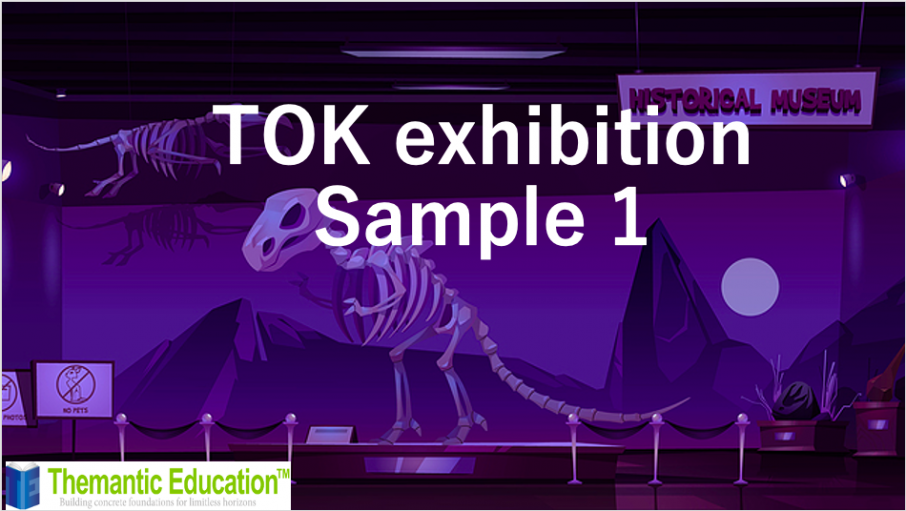
In this post you will find the first one of our TOK exhibition samples: the written commentary itself as well as a video that gives a step-by-step explanation of the full creation process.
TOK exhibition Sample 1 uses the following approach:
- Choose the IA prompt
- Think about one aspect in relation to it
- Find an object supporting it
- Link the object to the prompt
- Depending on how it was linked, choose where to look for the other two objects
The IA prompt that was selected is “Bias is inevitable in the production of knowledge”. The three objects are:
- the Big K (the prototype kilogram)
- Casio FX-83GT PLUS calculator
- Brendan Cole’s article “‘Little Red Riding Hood’ Banned from School over Sexism Concerns” (2019)
Why we are doing this

ThemEd’s TOK textbook for the new syllabus
We at Themantic Education think that the best way to support students in making their TOK exhibition is to demonstrate some specific examples – not only the final product, but the full thinking process that went into it. This way students will understand not only where they need to go, but also how to get there.
For this reason we have created several sample TOK exhibitions each using a slightly diff erent approach to selecting the objects.
Each of our sample exhibitions includes the fully written TOK exhibition commentary and a YouTube video that gives a step-by-step explanation of how the exhibition was created. Together they will help your students understand the process thor oughly.
Don’t forget to check out our other TOK exhibition samples! See Thematic Education’s IB TOK playlist on YouTube
(And buy our textbook , it’s awesome and different from all other textbooks)
EXPLAINER VIDEO: The process of creation
WRITTEN COMMENTARY: Is bias inevitable in the production of knowledge?
I will define bias as a systematic deviation. “Systematic” is what makes bias different from an error or a mistake. If we measure something 100 times, we will get slightly different readings each time – this is random error. However, if all our measurements are systematically slanted in one direction – this is bias.
If we want to show that bias is inevitable in the production of knowledge, we should find examples of knowledge that, by common sense, is most definitely not biased . Then we should try to find elements of bias in this believed-to-be-unbiased knowledge. If we do succeed in finding such elements, we must agree that bias is inevitable.
This is the Big K, the prototype kilogram. It is a block of platinum-iridium alloy that has been housed at the International Bureau of Weights and Measures in France since 1889. Back then scientists agreed to define a kilogram as the mass equivalent to the mass of this object. All 1 kg weights existing in the world today are copies of copies of copies of copies of this boulder. Scientists have taken great efforts to ensure that the mass of this prototype kilogram does not change. However, despite all precautions, it changed. Since 1889 it has become approximately 50 micrograms lighter – that is the weight of an eyelash (Resnick, 2019).
This object links to the idea of bias because, since the prototype has become lighter, we are systematically overestimating how much a kilogram is. It is a case of systematic deviation (which, by my definition, is bias). The object also illustrates the idea of inevitability of bias: the Big K has lost some mass due to natural fluctuations of matter, physical laws that are beyond human control.
This object was included in the exhibition because it demonstrates the idea that even the most precise scientific measurements are done against a standard, but standards themselves may change, and when they do, our new measurements become biased. I tried to find an example of something that is believed to be unbiased, and then I found an element of bias in it.
What are some other examples of knowledge that are typically believed to be free of bias? Mathematical knowledge has this kind of aura around it, especially when it is aided by technology. When we use a calculator, there is no reason to believe that the result of our calculation is biased. So it may seem.
This object links to the concept of bias because it is a case of systematic deviation from the truth. It is only this particular model, and this particular problem, that produces a biased result. This object also exemplifies the idea of inevitability of bias. The reason for this error is that pi is infinite, but the calculator’s memory is not. Therefore there is some truncation involved at some point somewhere. It is inevitable because technology cannot have infinite power.
This object has been included in the exhibition because it shows that even in something as certain as mathematics there could be systematic mistakes (biases). Unless we create technology that is infinitely powerful, we cannot recreate the infinite accuracy that is intrinsic in mathematics. Once again, I found something that is widely believed to be unbiased, and then I found an element of bias in it.
For my third object I am using Brendan Cole’s online article “‘Little Red Riding Hood’ Banned from School over Sexism Concerns” (2019) – this is a screenshot of the article.
The context behind this is that creating this exhibition has made me think about my own biases. I might have absorbed some cultural biases at an early age.
As described in the article, a school in Spain has withdrawn from its library 200 classic children’s books including Sleeping Beauty and Little Red Riding Hood, after analyzing them and concluding that they were “toxic” in how they depicted sexist stereotypes. For example, in Sleeping Beauty the man who kisses a sleeping woman without her consent is presented as a hero. No wonder some parents have made the choice to not expose their children to tales like that (Cole, 2019).
This object exemplifies the idea of bias because it shows how gender bias manifests in units of culture. It also conveys the idea of inevitability because we absorb these units of culture at a very young age when our critical thinking abilities are limited, so the biases may gradually become part of our personality on a deep level without us being aware of it.
This object has been included in the exhibition because it highlights another reason why bias is inevitable. While my first object (the Big K) shows that bias may be created by fluctuations of physical matter that are beyond our control and my second object shows that bias may be a result of ever imperfect technology, the third object highlights the idea that bias may be a result of cultural transmission at a young age. All three factors are very difficult or even impossible to avoid, which does indeed make bias inevitable.
Word count: 936 words
References:
Cole, B. (2019, November 4). ‘Little Red Riding Hood’ Banned From School Over Sexism Concerns. Newsweek . Retrieved from: https://www.newsweek.com/little-red-riding-hood-banned-school-over-sexism-concerns-1393134
Parker, M. [Stand-Up Maths]. (2020, July 17). Why do calculators get this wrong? (We don’t know!) [Video]. YouTube. https://www.youtube.com/watch?v=7LKy3lrkTRA
Resnick, B. (2019, May 20). The new kilogram just debuted. It’s a massive achievement. Vox . Retrieved from: https://www.vox.com/science-and-health/2019/5/17/18627757/kilogram-redefined-world-metrology-day-explained

Alexey Popov is a teacher of IB Psychology and Theory of Knowledge. He is an IB author, examiner and workshop leader. He also authored Oxford IB Psychology books. He currently lives in Hong Kong.
Subscribe to Our Blog

Unpacking the 2024 November TOK Titles: A Comprehensive IB Solved Guide

The November 2024 IB Theory of Knowledge (TOK) Essay Titles are out!
Let's be honest – tackling the TOK essay can be a daunting task. With so many ideas, concepts and topics at our disposal and a myriad of ideas swirling around, it's easy to feel overwhelmed at the outset.
That's where we come in.
In this article, we'll delve into each title and offer some strategic advice on how to approach them.
General Tips to Unpacking a Title
When we first encounter a prompt, we want to think in terms of perspectives and counter-perspectives (formerly known as claims and counterclaims). This framework allows for a structured essay, exploring the title through the lens of two chosen Areas of Knowledge (AOKs) and weaving in different arguments. While the ultimate conclusion you draw may often reside somewhere between these extremes or on a conditional basis (e.g. perspective 1 is correct in certain circumstances, while perspective 2 is a better approach in other), starting with opposing arguments can facilitate the development of a more nuanced exploration and argument.
So let's get to it – here is everything you need to know about the November 2024 TOK Essay titles:
Title 1: Does our responsibility to acquire knowledge vary according to the area of knowledge? Discuss with reference to history and one other area of knowledge.
Recommended AOKs: History (Mandatory) and Natural Sciences/The Arts/Human Sciences
This title prompts an assessment of whether we have different levels of responsibility to acquire knowledge across different AOKs. While you are open to argue against the title directly, suggesting that the responsibility is the same across AOKs, this would be unwise. It would be better to reflect on each AOK and perhaps present one perspective in support of the responsibility and one perspective against it, drawing a conclusion on which argument is stronger in each AOK.
Also consider the difference between the acquisition and production of knowledge – perhaps we have a broader responsibility to produce new knowledge in some areas of knowledge but not necessarily to acquire it as individual knowers.
Some perspectives you may consider:
Perspective: We have a responsibility to acquire knowledge to ensure that we construct an accurate record of the past. It is our responsibility to know our History and learn from the past.
Counter-Perspective: Historical knowledge is limited by subjectivity and collective memory, hence it is not essential to acquire knowledge of our past to build a successful future.
Perspective: We have a responsibility to acquire artistic knowledge to understand cultures and societies.
Counter-Perspective: The acquisition of knowledge in the Arts is for aesthetic purposes and enjoyment, not the fulfilment of a responsibility.
Natural Sciences/Human Sciences
Perspective: We have a responsibility to acquire new scientific knowledge for the continual development of mankind.
Counter-Perspective: Understanding how the world/humans work is not necessary knowledge for knowers to acquire.
Title 2: In the production of knowledge, is ingenuity always needed but never enough? Discuss with reference to mathematics and one other area of knowledge.
Recommended AOKs: Mathematics (Mandatory) and Natural Sciences/The Arts/Human Sciences
This is a super interesting title – ensure you define 'ingenuity' from the outset. The essay almost structures itself – your first paragraph in each AOK can consider how/whether ingenuity is 'always needed', exploring how this plays out in each AOK, while the second paragraph can explore whether or not it is 'never enough'.
Some ideas you may consider:
Paradigm Shifts – To revolutionise an AOK, often ingenuity is needed to enact a paradigm shift (a new way of thinking which changes the entire knowledge structure of an AOK) and to ensure progress.
Creativity – Creative thinking is important not only for AOKs such as the Arts, but even in Mathematics and the Sciences. Discovering innovative ways of devising experiments or utilising clever analogies to explain incredibly complex concepts is integral to these AOKs.
Structure – Ingenuity is only valuable within a framework for knowledge production, whether this be an artistic process or the scientific method.
Title 3: How might it benefit an area of knowledge to sever ties with its past? Discuss with reference to two areas of knowledge.
Recommended AOKs: History, Natural Sciences, The Arts and Human Sciences
The 'How' of this title restricts the scope to discussing different 'benefits' rather than a standard 'perspective-counter' analysis. It will also be important to define exactly what 'severing ties' involves – does this mean completely ignoring all past knowledge or simply becoming less attached to existing ways of thinking?
Some ideas for this title:
Fresh Ideas and Paradigm Shifts – By severing ties, you open up the possibility of acquiring knowledge which can overhaul an entire AOK, drastically accelerating progress.
Bias – By severing past ties, knowers can free themselves of the biases of their predecessors.
Innovation – Since existing frameworks of thinking often lead to similar conclusions, you can expand the possibilities of new knowledge by severing past ties.
However, you may interestingly conclude that these benefits are only reaped when ties to the past are severed to an extent, as it may be detrimental to an AOK to entirely negate past knowledge.
Title 4: To what extent do you agree that there is no significant difference between hypothesis and speculation? Discuss with reference to the human sciences and one other area of knowledge.
Recommended AOKs: Human Sciences and History/Natural Sciences
This prompt is very focused on your definitions. I would suggest defining these terms distinctly and precisely from the outset. The primary question which this title is asking is whether hypotheses are mere "speculation" or "guesses", or if there is a significant difference.
Also, if selecting the Human and Natural Sciences, please ensure that your perspectives aren't repetitious and highlight the differences between these AOKs.
Development – Speculation and hypothesis differ in the fact that the development of a hypothesis generally requires significant prior research and an understanding of existing knowledge
Experimentation – Hypotheses are developed purposefully and then empirical experimentation are conducted to provide evidence either in support or against them
Emotion – Speculation tends to come from 'feelings' or 'impressions', whereas the development of a hypothesis is far more methodical
Title 5: In the production of knowledge, are we too quick to dismiss anomalies? Discuss with reference to two areas of knowledge.
Recommended AOKs: Human Sciences/History/Natural Sciences
This title allows you to reflect on whether or not we dismiss 'anomalies' (a key term to be defined) too quickly when producing knowledge.
Paradigm Shift – Anomalies are often the prompt for a paradigm shift in the sciences, causing us to challenge existing beliefs and ideas
Exceptions – Often rather than investigating anomalies further and considering an overhaul of existing knowledge, anomalies are dismissed as 'exceptions' to the rule, rather than a justification to question the rule itself
Generalisation – There is often a focus on generating 'general' rules and theories which can lead anomalies to be dismissed (think of the Human Sciences – how often do we produce a rule about human behaviour but ignore those who behave contrary to the rule)
Title 6: In the pursuit of knowledge, what is gained by the artist adopting the lens of the scientist and the scientist adopting the lens of the artist? Discuss with reference to the arts and the natural sciences.
Recommended AOKs: The Arts and the Natural Sciences
This title requires you to define the 'lens' of each of these AOKs from the outset. It will be better to define them quite opposingly – the scientist is more methodical, experimental and structured, whilst the artist is more free-flowing and creative. You will then be able to take these attributes and argue which elements would be better across the two disciplines.
Creativity – Scientists can benefit from the creativity of artists when developing innovative ways of experimenting, presenting results and constructing abstract theories
Structure – Artists can often benefit from a methodical approach to constructing art, particularly when aiming to convey a specific message or purpose through their art
Flexibility – Artists are often quite flexible when constructing an artwork, always willing to change and adapt to their free-flowing thoughts, an attribute which is highly beneficial for scientists who at times may become rigid in their thinking and fixed to pre-existing scientific beliefs.
And that's it - our comprehensive guide to the 2024 November TOK Titles! If you're still racking your brain as to how to begin the writing process for your TOK essay, why not check out our post on The Complete IB TOK Essay Guide . Or check out one of our Grade A Exemplar TOK Essays ! Or better yet, if you are looking for some more personal assistance with your IB TOK Essay, click below to reach out to us and we can work with you through the entire writing process, from title selection to the best structure for success!
- Internal Assessment Guides
Recent Posts
The Secrets to Success in the Theory of Knowledge (TOK) Essay
Unpacking the 2023 November TOK Titles: A Comprehensive IB Solved Guide
EXPLAINED: May 2024 TOK Essay Prescribed Titles
What happened to this post? HackIB has been acquired by MyIBTutor . All content is now available on the MyIBTutor Blog with more exciting IB content to come! Click here to see it for yourself!
Looking for November 2024 Session TOK Essay titles? Click here.
TOK Essay Titles – May 2024 Examination Session
The titles for May 2024 are released! Here they are below:
Make sure to bookmark this page as I explain and provide examples for each of these titles in depth! UPDATE: Title 1, 2, 5 and 6 are now available. Stay tuned for more! For general guidance on how to write a good TOK essay, check out my TOK Essay advice collection .
Is subjectivity overly celebrated in the arts but unfairly condemned in history? Discuss with reference to the arts and history.
How can we reconcile the opposing demands for specialization and generalization in the production of knowledge? Discuss with reference to mathematics and one other area of knowledge.
Nothing is more exciting than fresh ideas, so why are areas of knowledge often so slow to adopt them? Discuss with reference to the human sciences and one other area of knowledge.
Do we underestimate the challenges of taking knowledge out of its original context and transferring it to a different context? Discuss with reference to two areas of knowledge.
Do we need custodians of knowledge? Discuss with reference to two areas of knowledge.
Are we too quick to assume that the most recent evidence is inevitably the strongest? Discuss with reference to the natural sciences and one other area of knowledge.
This title attempts to challenge students on the main school of thought that you learn over the TOK course. The gist of your TOK teaching on both of these AOKs probably boiled down to something like: everything is art and it’s just whatever the artist wants to create, while history is always biased because the winners always write all of history. However, this eliminates much of the nuance in each of these AOKs that are worth exploring. That’s what makes this prompt interesting.
Is subjectivity overly celebrated in the arts? I will be honest, I never thought we really ‘celebrated’ subjectivity. It just, was. Inherently, art is a subjective exercise – you can think about this point a little further. You will find some heated discussion on whether art is subjective or could it be objective on the internet and I won’t delve into that here, because it isn’t the point of this title. The key here is to focus on the EXTENT of subjectivity and is it to the detriment of the area of knowledge itself. Then, we have to consider, whose subjectivity are we talking about: is it the artist’s subjectivity, or the audience’s subjectivity. For example, the Mona Lisa wasn’t that well known when it was first painted. I’m sure the Da Vinci thought it was quite a nice piece, but it seems like we didn’t really celebrate his subjectivity. It wasn’t until a certain audience found it subjectively good, that we accepted it as one of the greatest pieces of art in the world! That is an example of how subjectivity is relevant in the dissemination of artistic knowledge. For a more modern example, what about your favourite YouTuber? Do they truly make what they want? NO! They are often beholden to sponsors, and you – the audience! What you want to see, is what they will make! So it is YOUR subjectivity that drives their decision to produce art, not necessarily purely their subjectivity. Subjectivity by definition is just a person’s opinions, emotions, thoughts. This connects well with the TOK concept of values. What VALUES and WHOSE values are determining what art is created (in a variety of contexts), how art is perceived, and how art changes in its reception over time? These are all good questions to ponder. For more unconventional examples about art, think about how museums choose what art to display, what constitutes good art for prizes like the Nobel Prize for Literature, or why some art is considered more expensive than others? Are there systematic ways to think about our subjectivity and how we apply it to art? Is it really overly celebrating subjectivity or simply a necessity to make sense of the abundance of artistic knowledge in a sea of information today?
History gets a bad rep in the TOK classroom. Students like to trash on History calling it biased and unreliable. In this prompt, I don’t want you to refute these claims, but just think about how they aren’t necessarily catastrophic as we might think. We aren’t denying that biases in history could be problematic. I would be suspicious too, if the only accounts of the Rohingya Genocide came from the Myanmar military. However, the word condemned in the title suggests that we might be too harsh on historians when they get things wrong. We should focus on how the historical method recovers itself from failures in biases from its sources. Yes, it might be biased, but is it better than no history? Furthermore, does subjectivity actually ADD value to the way we produce, and interpret historical knowledge? While I’m sure a completely objective, news story like report of what happened in 1886 would be a historian’s dream, that isn’t the case! No matter how objective we try to be, we colour the events we experience by our own opinions, feelings and emotions. But isn’t that history in itself? In an almost cliched way, history’s subjectivity tells us more about what happened in the past and their beliefs and values more than words could ever say.
In both the historical and artistic discussions, you should focus more on the methodologies of these AOKs and how they achieve their AOK’s purpose. Subjectivity manifests in different ways in these AOKs and their methodology reflects that. In the overt awareness of subjectivity in the Arts, its method to produce knowledge is characteristically defined by subjectivity. In History, the method is to identify the covert influences of subjectivity, then to produce the most truthful knowledge possible. You can see that the goals of these two are different, and hence they deal with subjectivity differently. Don’t fall in the trap of focusing your discussion too much on your examples, but generalise to the patterns of how subjectivity manifest in your AOKs and whether their treatment of it is problematic.
It is crucial, when writing the essay for this prompt, to clearly define in your introduction what specialisation and generalisation means. DO NOT use the dictionary definitions here – since this is a TOK Essay, you want to make a TOK version of specialisation and generalisation, in terms of how these two things differ in the production of knowledge. Clearly defining the two in this way will form a solid foundation for you to have a nuanced discussion on this process of reconciliation between the two. The prompt hints at the competing demands on knowledge of specialisation and generalisation – i.e. you might not be able to produce knowledge in the same way if you were aiming for specialisation versus generalisation. So, this provides a point of contrast for you to choose examples and frame your discussion. Remember, the idea of competing demands is an ASSUMPTION, not an argument posed by the question. You should focus on how your chosen examples demonstrate a way to balance the interests of both and reach a ‘middle-ground’ rather than arguing that specialisation or generalisation are compatible with each other. TLDR: Don’t challenge the assumption.
For the first AOK of Mathematics, you should have encountered many personal examples just from your study of IB Maths. Most of your learning has been on generalisation, and the application of such generalisations. For instance, you learn about Calculus, a general topic within Mathematics, and then apply it in various contexts. Mathematicians love generalisations – that Calculus you learned? Well, the definition of a derivative generalised for all functions could be summarised by the first principles of derivatives function that HL AA students learn. You would have less interaction with specialisation of Mathematical knowledge. In a broader sense, the specific components of mathematics, cannot be separated from the general. You can’t solve calculus problems without the fundamental theorem of calculus. However, you could argue that the fundamental theorem of calculus didn’t need calculus problems to exist. Thus, an interesting dilemma arises in Mathematics – the generalisation could be produced, without a particular need for specialisation, but specialisation often calls for generalisation to first exist.
Looking at the latest mathematics research, you will find that applied mathematics is most common. Rarely do you see people get excited by new discoveries of solutions to elliptical curves, but more do when you tell them a new mathematical model to improve our prediction of the weather. We may place greater value on specialisation of knowledge, because we could see its usefulness more immediately, but, the Area of Knowledge does not require such specialisation to produce knowledge. So, do we encourage people to produce knowledge with the goal of specialisation in mind, or do we tell them to produce whatever theoretical generalised mathematical knowledge they can? Look to how mathematics is applied to Quantitative Finance, Econometrics, and Actuarial Science. They specialise mathematical knowledge and provide for some of the most lucrative careers. Does that speak to our preference and demand for specialised knowledge? But then again, what of the interdependence between generalisation and specialisation? How do we balance the two and how does the methodologies of the AOK contribute to this balancing act?
For the second, complimentary AOK, you could have discussions with all of the AOKs. For the Sciences, you could present a similar argument about needing to have some general theories before you could specialise. The scientific method is essentially one big generalisation process – you take specific observations and you make inferences so that you can generalise about some natural process. However, the knowledge that produces need not be general, it can still be specific. If we take specialisation as the goal, then we could pose narrow hypotheses to test. If we take generalisation as the goal, then we might need multiple of these narrow hypotheses to form a full picture, testing each individual case. Thus, specialisation could lead to specialisation alone, but more often, generalisation is the result of many specialisations.
One last question you might want to consider and attempt to answer in your essay is, do you want to know something about everything or everything about something? The answer to that will depend on your AOK. While we want to know about everything on everything, that is simply not reality. So, what trade offs do we make in each AOK, and how does each AOK decide on what we need to know more on?
You might be able to appreciate how long it takes ideas to actually be implemented in reality by looking at the recent Nobel Prize winners for Economic Sciences. The winner of the 2017 prize was Richard H. Thaler, for his contributions to behavioural economics. He explored the impacts of limited rationality, social preferences and the lack of individual self-control on economic decision making on an individual and market level. He started these findings from the 1980s, but it is only recently, in the 2022 revision of the IB syllabus that Economics students learn about the field of Behavioural economics in any detail! So why is it so?
To some extent, it is hard to criticise things for moving slowly. After all, new discoveries like behavioural economics represents a fundamental paradigm shift towards the way research is conducted in the particular AOK. Often times, fresh ideas are left to “ferment” so that their truthfulness can be tested with time. Nothing is more embarrassing than going down a rabbit hole only to find that your assumptions turned out to be monumentally incorrect. Even if we are making a big shift in light of new ideas towards the way we produce knowledge, doing so takes time! For many years and still now, we rely on strong assumptions of rationality to make economic models function. While the psychology of such behaviours are well researched, applying them to an Economic setting may not be. That is to say, it is important to consider how these new ideas arise, and what effect it has on existing knowledge, and the way we produce future knowledge. New ideas is simply new knowledge, but with the added implication that it has some effect on the existing knowledge within an AOK. It could potentially change how we view current knowledge, or how we conduct research given a particular discovery.
In the AOK of the human sciences, which broadly follows the scientific method, you could drawn some inspiration from the philosopher Thomas Kuhn’s view of scientific progress. He argues that within a period of “normal science” where we make incremental progress under the assumption of an overarching model, but there comes a point where we notice accumulation of imperfections with such a model that leads to new paradigms – new ideas, that fundamentally change how we do science. Then we undergo a sort of scientific revolution, where there are debates and decisions made over what sort of model we need to follow, until everyone eventually accepts the new paradigm and returns to a normal science period so that continual small improvements are made to knowledge, until another paradigm shift happens again. While you are not expected to demonstrate such strong philosophy knowledge within the TOK Essay, it is helpful to consider how each AOK handles such ‘revolutions’. For instance, it is harder to irrefutably find falsities in human sciences given the difficulty in replicability and corroborative studies compared to natural sciences.
As for complimentary AOKs, any would suit here, as each AOK has a very different way to handle new ideas. Many factors influence the way new ideas is accepted. For this title, we need to take the assumption that their acceptance is slow, not argue with it. Instead, you should consider what factors influence this slowness, and how different AOKs have different factors in mind when deciding how to accept new ideas. This relates to the nature of the AOK (what is its purpose) and the methodology guiding knowledge production in them.
Have you ever said something that sounds very weird out of context? That might have just been something silly with no real consequences, but in the realm of knowledge, we need to be careful about the consequences of knowledge taken out of their original context. This article highlights how the context of medical treatment matters a lot! As you can imagine, something that works in one field, doesn’t always apply in a straightforward manner to another. This is why there are whole research teams dedicated to what we call “translational research”. That is, trying to “translate” what you get from something like a lab setting, into actual products, like life-saving medications.
The obvious links to AOKs here are the Natural and Human Sciences. For Natural Sciences, we often start off knowledge production in a lab setting, or in a controlled environment. However, the application of such knowledge is rarely as controlled! So an interesting point to consider is how natural scientists have to account for the fact that their findings won’t ever be used in as perfect a setting as their research. Sure, you might have developed bullet proof wood , but how is that going to work in practically when it comes to mass manufacturing it for the army or the police? This is one of the biggest challenges that natural scientists face. It’s not that we aren’t trying to produce exciting knowledge, but that the application of such knowledge in a practical and appreciable context is often very difficult. Something like the mRNA technology (which recently was awarded a Nobel) took a long time to be developed into actual vaccines. The question then is, do we underestimate this process? Often it depends on the goal of the scientist. If the knowledge producer set out with an idea to commercialise in mind, then they would often consider the practical implications of findings. However, people studying theoretical physics for example, would struggle to immediately find very accessible real life implications. That doesn’t mean the knowledge is worthless, but certainly, the challenges are there.
What about non-scientific disciplines? Recently, I went to an art exhibition that trend Van Gough’s paintings into a 3D digital display. There was a Banksy exhibition that took the original murals he painted on the street, into this museum environment. Does changing the context of how art work is shown, and the manipulation of artistic knowledge change its meaning? What is the goal of transforming art into a different context? There are many reasons. Sometimes, it is to create satire (have a look at the parodies of the Mona Lisa), bringing old art onto a new audience (like VR exhibitions of Da Vinci), or simply making it more accessible to people (by making art works digitally available). The producers of these adapted forms of knowledge take great care in considering how this impacts the meaning of the art in its changed form. When artwork is so subjective, the context of art is often required to understand the artist’s meaning and intention, to ‘interpret’ works accordingly. At the same time, as we know art is quite subjective, is a ‘correct interpretation’ always required? If we are to remain artistic purists, then many of the joys of art could be lost! Imagine if you were admonished for listening to Taylor Swift through Spotify on your AirPods because it isn’t the original uncompressed music file with all the details, and you aren’t listening to it on the exact set of thousand dollar speakers it was created with? It would be ludicrous to assume that artistic knowledge is always going to be disseminated in the same context. Thus, this must be a consideration of artists. Is this consideration more or less difficult for different types of art? How is this consideration different to science considering there is no ‘right’ answer to interpreting art?
When thinking about this title, we aren’t arguing whether it is difficult. I think we all agree it is. However, it is about whether we underestimate just how difficult it is! Center your focus on how each AOK’s methodology highlights the consideration of being able to change contexts, and whether that affects the interpretation of the knowledge in question.
The term ‘custodians of knowledge’ is not something TOK students have likely heard of before, but this concept is relatively simple to understand. If you think positively about it, it could be protectors of knowledge, people who preserve knowledge, keeping it for generations to come – for example, some people might consider the Indigenous Peoples’ in Australia to be custodians of their unique cultural knowledge and what they call dreamtime stories. In this way, they keep culture alive, even if most people nowadays speak English and don’t readily tell their history. However, thought about negatively, it could also mean “gatekeepers’ (pardon the Gen Z language) of knowledge. The idealogical “protection” of knowledge could also be seen as a way to prevent some forms of knowledge from becoming knowledge in the first place. Talk to any university academic, and they will tell you how many times their research papers have been rejected. That’s why there is a bias towards statistically significant results, while research that showed that nothing significant has happened doesn’t often get published. Thus, these two contrasts provide for interesting discussion, particularly when considering how each AOK has different forms of custodians of knowledge and how they “gatekeep” or “protect” knowledge in different ways.
Take the AOK of the arts as an example. The career of artists are laughed upon because it is so hard to “break in” to the fine world of art. Many artists aren’t acclaimed until they are long dead. Perhaps most famously, the Mona Lisa wasn’t very well known until several hundred years after it was made. Thus, artists are often at the mercy of custodians of artistic knowledge like art curators and critics, who decide what merits acknowledgement as knowledge. After all, knowledge is only knowledge when there is consensus it is. And if the big wigs in the art industry doesn’t think it’s worth a mention, your art, however brilliant it seems to you, would not reach the consensus required to be considered knowledge. Of course, there are debates on the necessity of custodians in such a subjective AOK. After all, there were many times I questioned how some “artworks” even made it into the modern art museum when it’s literally splashes of paint on a canvas. I digress. However, there is something to be said about maintaining some form of standard to art. We judge whether some art is good or bad, but not in a very rigorous way. Custodians of knowledge supposedly have a framework to make such judgement in a way which preserves the nature of the AOK, and the knowledge within it. Therefore, discussion about the necessity of the custodians should focus on how they contribute to the purpose of the AOK, and whether it is compatible with the nature and methodologies of the AOK.
To further illustrate what I mean, you could see that Natural Sciences might present a stronger argument to the necessity of such custodians. We implicitly “trust” science, for better or for worse, because we know that there is a level of credibility imbued by the scientific method. It is the custodians’ role to maintain the standard of adherence to the scientific method that keeps this credibility alive. This is why, when flat earthers argue that they can’t see the curvature of the earth from the horizon, that it doesn’t get published in a scientific journal as fact! This is why, when research emerges that denies the existence of climate change, custodians have a responsibility to retract such research . However, at the same time, it also places much pressure on producers of such knowledge to create something worthy in the eyes of custodians. You might have heard of the data manipulation scandal that forced Stanford’s president to resign. Thus, custodians do appear quite important in this AOK, when we value the truthfulness of knowledge so much, but that isn’t without its consequences.
I recommend picking two contrasting AOKs that value much different things when writing the essay. While comparison is not a requirement for the essay, it gives you a more nuanced understanding of the question and thus a more reflective piece. For instance, we have just demonstrated that art is relatively subjective, while the sciences are less so. Thus, this influences the role which custodians need to play in each AOK.
The framework to answering this title for many students will follow a similar structure: an example of when novel evidence was accepted and had groundbreaking impacts, and another example where such evidence was problematic and disputed. Repeat this for the second AOK you choose and you’ll have 4 contrasting examples. This is not the only way to approach this title, but is my personal preference considering the structure I suggest to most students that ensures firstly, you will pass the basic criteria of a TOK Essay, and secondly, you will have a strong foundation to succeed. However, since everyone will have a similar style and collection of examples, it is even more important for this title, that you tease out the meaning and the effect on each area of knowledge, and knowledge in general, that your examples represent.
To demonstrate what I mean, let’s focus on two natural sciences examples. First, consider the case of “Cold Fusion”, a theory that you could supposedly have nuclear fusion at room temperature, discovered and subsequently debunked in 1989. A contrasting example, could be recent Nobel Prize winner of Medicine and Physiology, for the research on mRNA vaccines. Immediately, it is obvious that one shows where recent evidence isn’t the strongest, while the latter shows that it could be. But the focus should be on are we TOO QUICK in assuming so, not whether we should or not. Well, what are the reactions and timelines for each example? While Cold Fusion was met with excitement from the general public for the potential it holds for energy production, I wouldn’t say we ‘assumed’ it to be strong. Looking at the news reports from that time, you can see that there was great anticipation about the discovery, leading to lots of sudden funding and interest to investigate it and replicate it. As for mRNA, that discovery took a long time! First the technology, and the getting it to not appear foreign to the human body was very tricky. Even after it was discovered, we waited quite a while, with many people’s first experience with mRNA to be their COVID 19 vaccine. What you need to draw from these two examples is the methodological similarities and differences which reflect the NATURE of Science, and thus, the purpose of science. You see in both how there is an emphasis on replication which corroborates or falsifies, and only after doing so for a long time do we accept it to be true, otherwise it is debunked. So yes, there are moments where Natural Sciences provides strong compelling evidence that ends up false, there are many hurdles with in the methodology of the Natural Science that prevents us from being TOO QUICK to assume it to be true.
For this prompt, it is too easy to fall into the debate of why something was true or why something was false and tricked the population. This is not the point of the essay. You should avoid talking about the specifics of your examples at length. You need to demonstrate how your examples reflect the wider methodologies of the Natural Sciences (and similarly, for your second AOK) that either encourages or discourages our assumptions that novel evidence is always best. As you can see from my examples above, I focused on how such assumption does not happen too quickly because there are many ways we verify scientific knowledge to be true. I don’t discuss the specifics of the actual science behind Cold Fusion or mRNA as that isn’t required. You are better off focusing on the methodologies behind the AOKs themselves and answering the question.
Some interesting complements to the Natural Science AOK could be History (particularly focusing on revisionism and how historical events could be interpreted differently over time), Mathematics (how could the methodologies differ and are there ‘mistakes’ in Maths), or even Human Sciences (replication is a bit more difficult with that!).
Share this:
20 responses to “explained: may 2024 tok essay prescribed titles”.
Hi, when will you deconstruct #6? Much appreciated.
I just did! Hope it helps.
Thank you so much!
hello! when will you deconstruct #2? would really really appreciate it !!!
Just posted!
Hi when will you deconstruct No. 5? Much appreciated.
Could you please deconstruct no5. ?
Check it out!
Please Please deconstruct 5 ASAP, first draft due in 5 days!!!! Thanks!
I just did! It’s a very interesting title.
Hi, when will you deconstruct #3? Much appreciated.
I have just posted this. Thanks!
Hi, when will you deconstruct #4? Thanks!
Just updated!
Hi, is there more in depth analysis of title 4 coming?
Sorry it took a while, but it’s here now!
I have a question, for PT3, so what will be our possible counterclaim? is it another factor that will make it slow? or find another RLS that show sometimes fresh ideas can be adopted fast ?
I would reread the prescribe title. The title is asking you “why”. So all you need to do is propose different sorts of reasons as to why this slowness occurs. You don’t need to challenge the assumption within the title that it is slow. Accept that it is slow, and propose various ideas for why that is the case according to the properties of your chosen AOK.
Could you explain how you would format number One. Would I only be talking about two examples one for each AOK and what about them? Introduction, aok 1 and aok2 and conclusions
For sure! You should refer to my article on structuring for TOK Essay for more details. In general though, you can approach this prompt with two examples for each AOK, with one example about subjectivity being overly celebrated, and one not in the arts, while for history, it would be one where it is condemned unfairly vs not.
Leave a comment Cancel reply

- Already have a WordPress.com account? Log in now.
- Subscribe Subscribed
- Copy shortlink
- Report this content
- View post in Reader
- Manage subscriptions
- Collapse this bar

Literary Analysis Essay
Literary analysis essay generator.

Literary analysis essays offer a deeper understanding and interpretation of literary works, allowing readers to delve into the intricacies of a story, poem, or novel. Whether you’re a student or a literature enthusiast, analyzing literature can be a rewarding experience. In this article, we will explore a collection of 30+ literary analysis essay examples available in Word, Google Docs, and PDF formats. We will also discuss essential elements such as analysis paper outlines , literary devices, short story analysis, literature reviews, theses, analogies, book reviews, context, and conclusions.
1. Literary Analysis Essay Outline Example
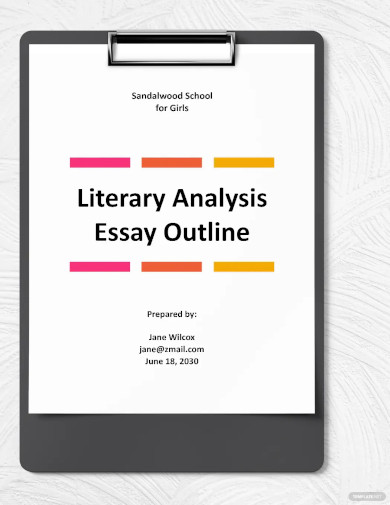
- Google Docs
2. Quotation Literary Analysis Essay Example
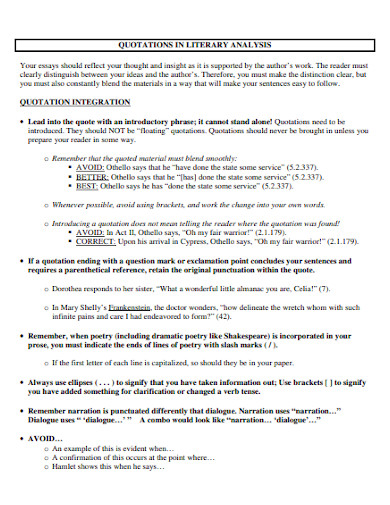
Size: 33 KB
3. Printable Literary Analysis Essay Example
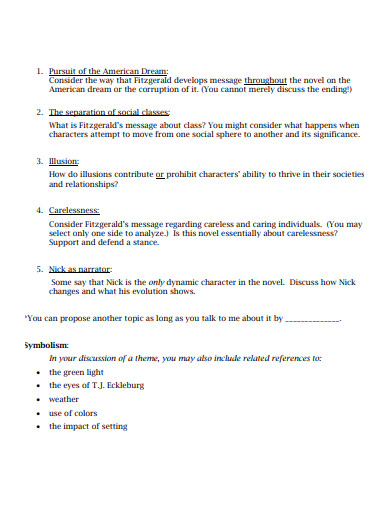
Size: 252 KB
4. Building a Literary Analysis Essay Example
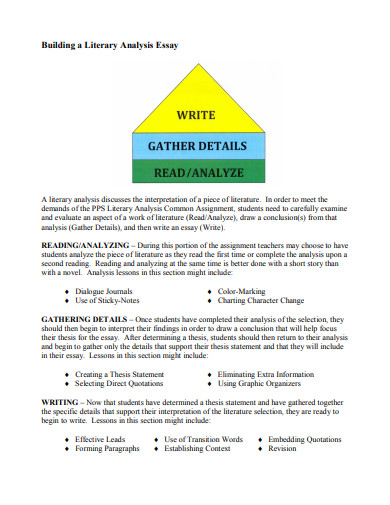
Size: 195 KB
5. Literary Analysis Essay Score Sheet Example
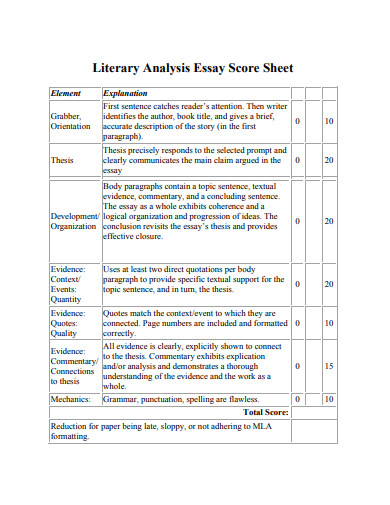
Size: 81 KB
6. Sample Literary Analysis Essay Example
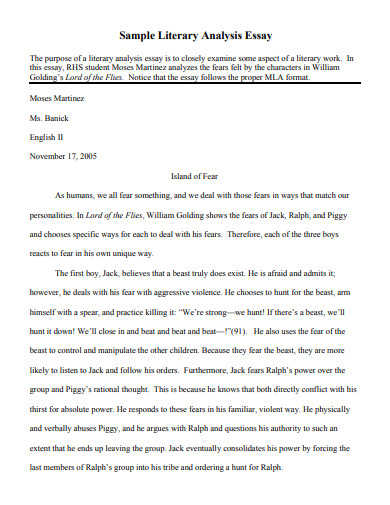
Size: 63 KB
7. Literary Analysis Essay Checklist Example
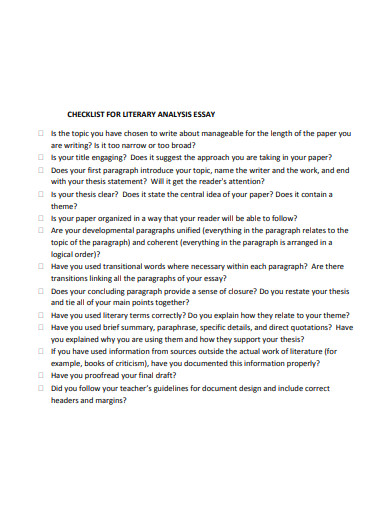
Size: 180 KB
8. Literary Analysis Essay Outline Example
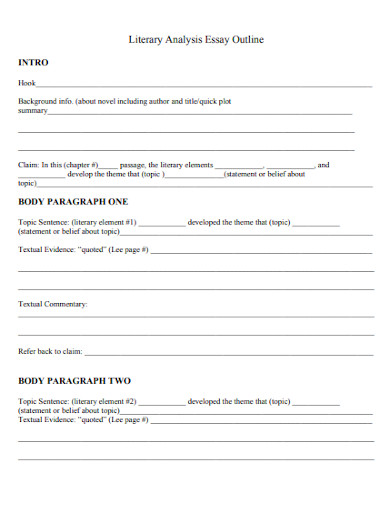
Size: 51 KB
9. Editable Literary Analysis Essay Example
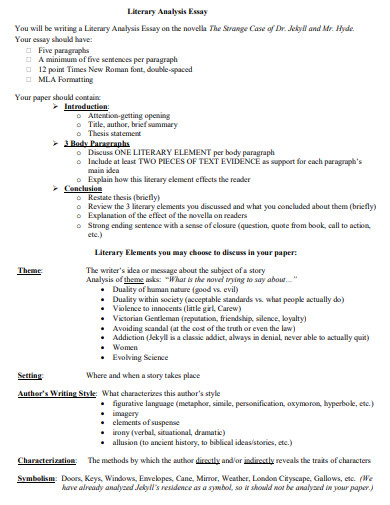
Size: 336 KB

10. Peer Editing Literary Analysis Essay Example
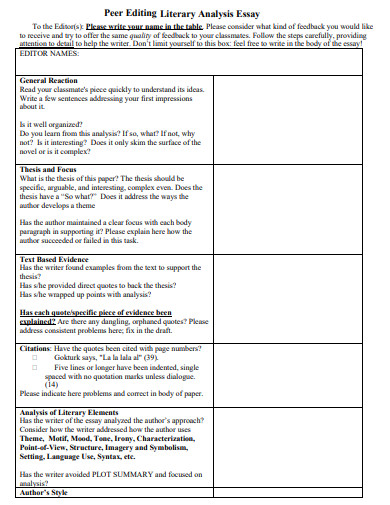
Size: 226 KB
11. Professional Literary Analysis Essay Example
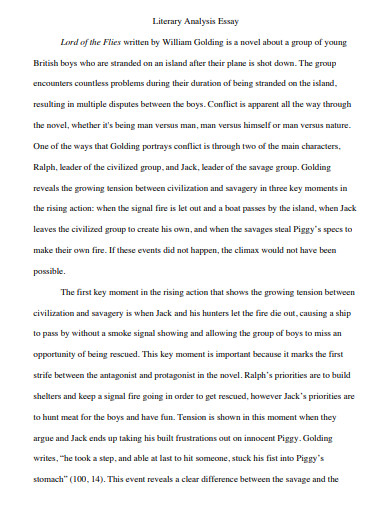
Size: 41 KB
12. Literary Analysis Assessment Outline Essay Example
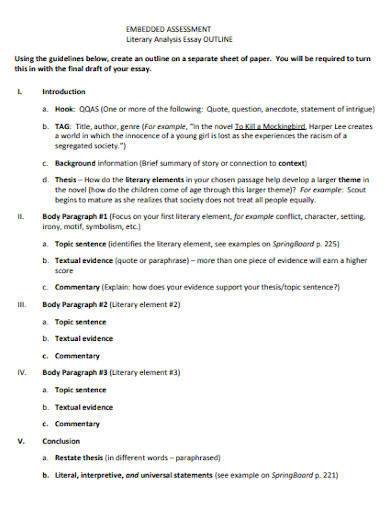
Size: 61 KB
13. High School Literary Analysis Essay Example
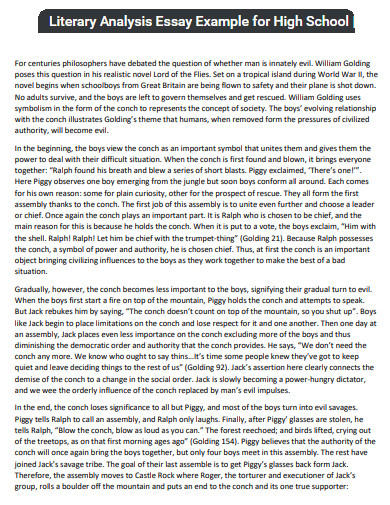
Size: 95 KB
14. Evaluation of a Literary Analysis Essay Example
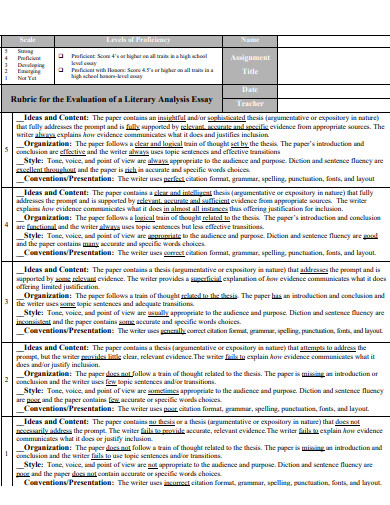
Size: 22 KB
15. Graphic Organizer Literary Analysis Essay Example
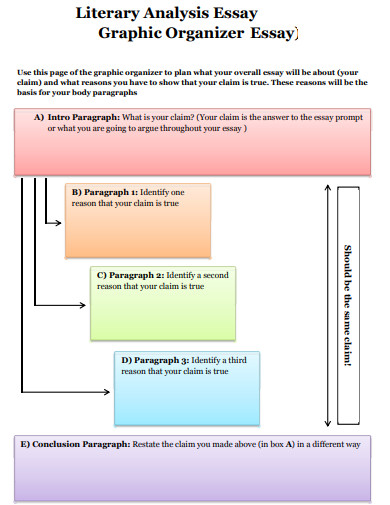
Size: 306 KB
16. Literary Analysis Essay Structure Example
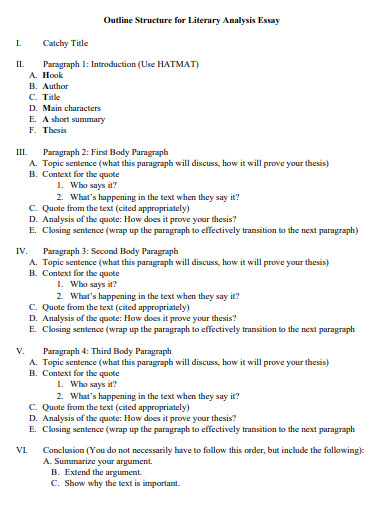
Size: 178 KB
17. Literary Analysis Essay Writing Example
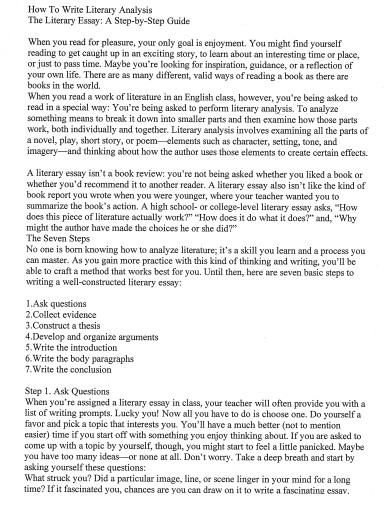
18. College Literary Analysis Essay Example
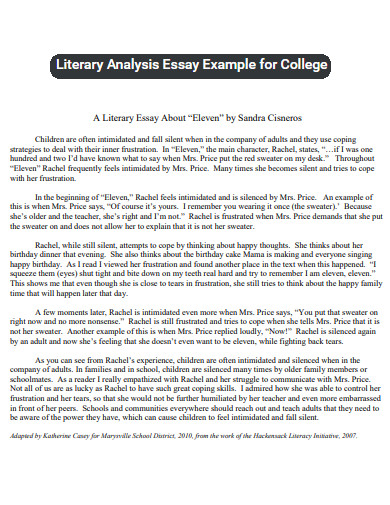
Size: 468 KB
19. Literary Analysis Essay Rubic Example
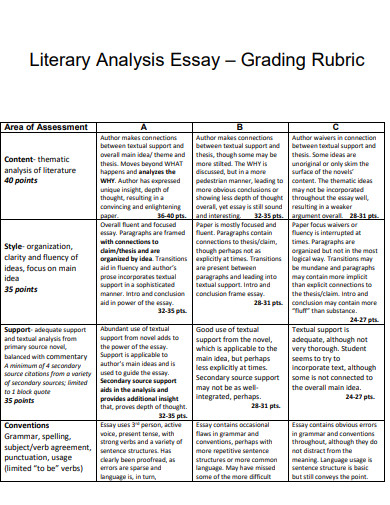
Size: 644 KB
20. Simple Literary Analysis Essay Example
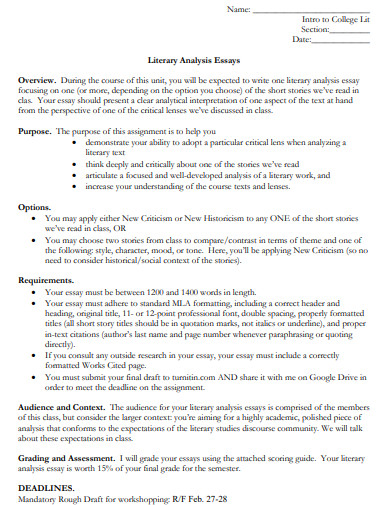
Size: 88 KB
21. Writing a Literary Analysis Essay Example
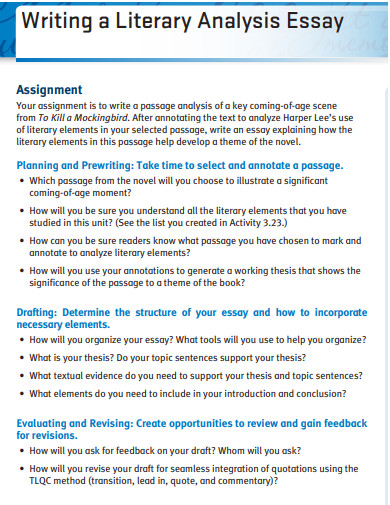
Size: 500 KB
22. Introduction to Literary Analysis Essay Example
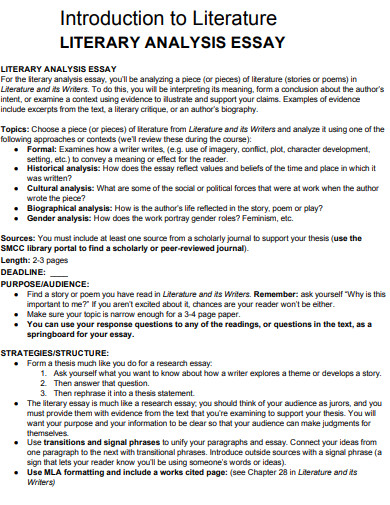
Size: 368 KB
23. Short Story Literary Analysis Essay Example
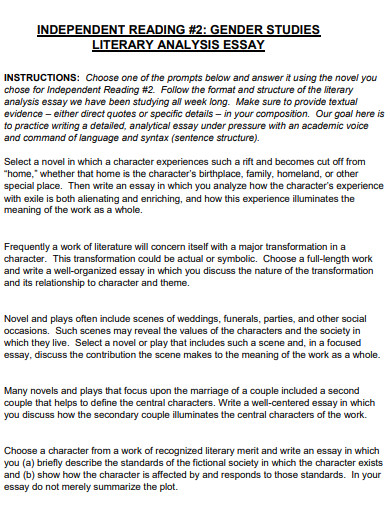
Size: 103 KB
24. 8th Grade Literary Analysis Essay Example
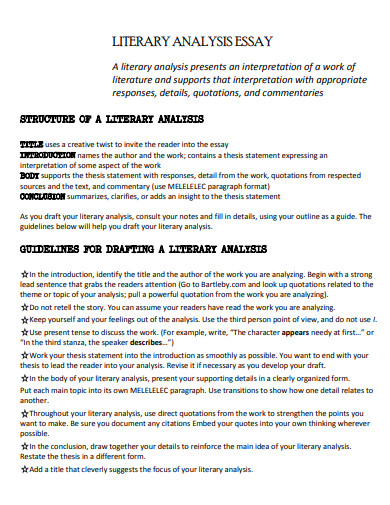
Size: 278 KB
25. Literary Analysis Essay Assignment Example
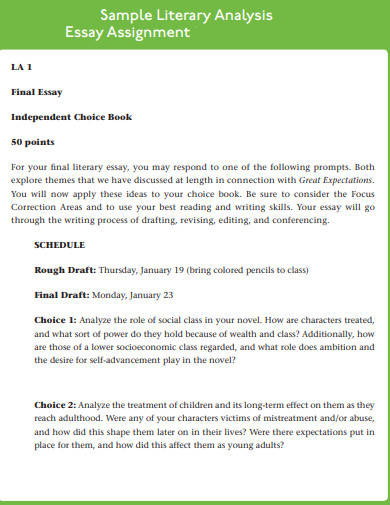
Size: 47 KB
26. Literary Analysis Video Essay Example
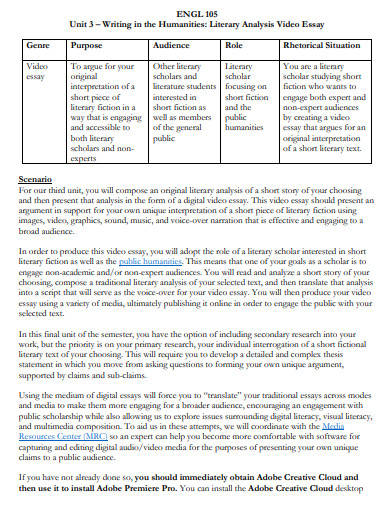
Size: 208 KB
27. Student Guide for Literary Analysis Essay Example
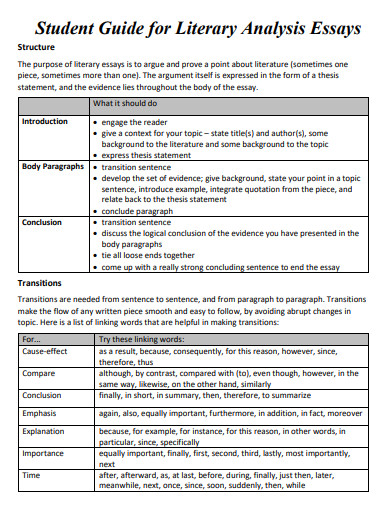
Size: 956 KB
28. MLA Literary Analysis Essay Example
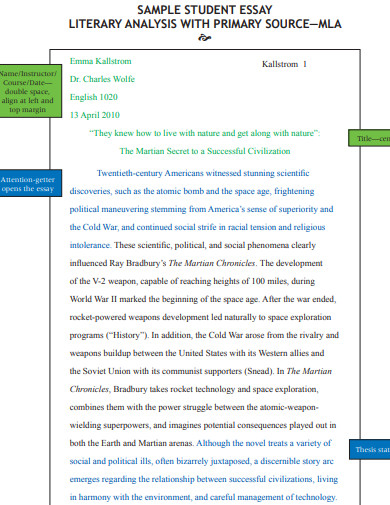
Size: 116 KB
29. Draft Literary Analysis Essay Example
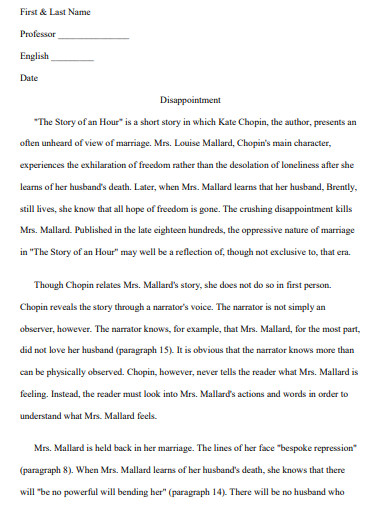
Size: 112 KB
30. 9th Grade Literary Analysis Essay Example
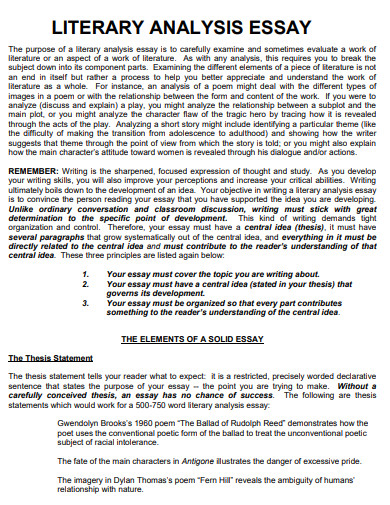
Size: 93 KB
31. Literary Analysis Essay Guide Example
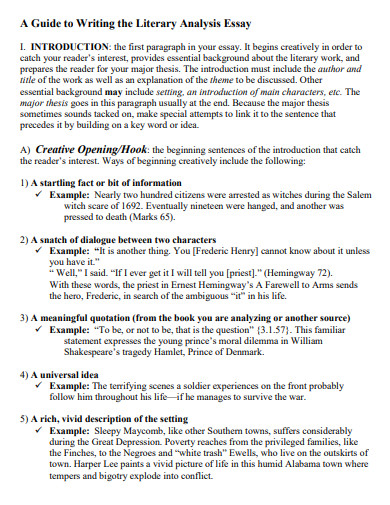
Size: 36 KB
What is a Literary Analysis Essay?
A literary analysis essay is a critical examination and interpretation of a literary work. It involves analyzing various elements such as plot, characters, themes, and literary devices to uncover deeper meanings and insights. By dissecting the text and exploring its nuances, readers can gain a deeper appreciation for the author’s intentions and the work’s impact. A well-written literary analysis essay provides a comprehensive analysis that goes beyond surface-level observations.
How to Write a Literary Analysis Essay
Before we dive into the examples, let’s outline the steps involved in writing a literary analysis essay:
Step 1: Choose a literary work:
Select a literary work that you want to analyze. It could be a novel, short story, poem, or play. Ensure that the chosen work is rich in literary elements and offers ample material for analysis.
Step 2: Familiarize yourself with the work:
Read the literary work carefully, taking note of important plot points, characters, themes, and literary devices. Pay attention to the author’s writing style and the overall tone of the work.
Step 3: Develop a thesis statement:
Craft a strong thesis statement that encapsulates your main argument or interpretation of the literary work. Your thesis should be clear, concise, and debatable, providing a roadmap for your analysis.
Step 4: Gather evidence:
Collect evidence from the literary work to support your thesis statement. Look for specific examples, quotes, and literary devices that reinforce your analysis. Take note of the context in which these elements appear.
Step 5: Organize your essay:
Create an analysis paper outline to structure your essay effectively. Divide your essay into introduction, body paragraphs, and conclusion . Each body paragraph should focus on a specific aspect of your analysis, supported by evidence.
Step 6: Write your essay:
Start with an engaging introduction that provides background information and introduces your thesis statement. In the body paragraphs, analyze different aspects of the literary work, providing evidence and explanations. Ensure a smooth flow between paragraphs. Conclude your essay by summarizing your main points and reinforcing your thesis .
What are some examples of literary devices?
Literary devices are techniques used by authors to enhance their writing and convey meaning. Examples include metaphors, similes, personification, alliteration, and symbolism. For a comprehensive list and explanations, refer to Literary Devices .
Are there any specific examples of short story analysis essays?
You can find examples of short story analysis essays in PDF format here . These examples provide insights into analyzing the elements of a short story effectively.
How does context impact literary analysis?
Context plays a crucial role in literary analysis as it helps readers understand the historical, social, and cultural background in which the literary work was written. It provides insights into the author’s intentions and influences the interpretation of the text.
Text prompt
- Instructive
- Professional
Analyze the theme of courage in a novel for your Literary Analysis Essay.
Write about the use of symbolism in a short story for your Literary Analysis Essay.
- Share full article
Advertisement
Supported by
DealBook Newsletter
TikTok’s Legal Bet on the First Amendment
The popular video-sharing app faces uncertain odds as it takes its fight to court to turn back a potential ban in the United States.
By Andrew Ross Sorkin , Ravi Mattu , Bernhard Warner , Sarah Kessler , Michael J. de la Merced , Lauren Hirsch and Ephrat Livni

TikTok takes its fight to court
TikTok fired the latest broadside in its battle with Washington, suing to block a law that could force the company to split from ByteDance, its Chinese owner, or face a ban in the U.S.
The company argues that the law violates the First Amendment by effectively killing an app in the U.S. that millions of Americans use to share their views. Another problem: a divestiture within 270 days is practically impossible, Sapna Maheshwari and David McCabe report for The Times .
DealBook spoke with Maheshwari about the lawsuit filed yesterday and what happens next.
Do legal experts think TikTok has a chance at winning?
It could go either way.
Alan Rozenshtein, an associate professor at the University of Minnesota Law School, says that a victory is possible based on the “very, very substantial First Amendment challenge” involved. But he emphasized that it isn’t a certainty.
The government can justify infringing on First Amendment rights in certain cases — especially in matters of national security — and it’s also offered ByteDance the option to sell the app.
How does the lawsuit address the accusation that TikTok is a national security risk?
TikTok has always said that it has spent billions on a security plan that has addressed the government’s concerns. But it also shared a bit of a bombshell in its filing: The company said it had agreed to offer the U.S. government a kill switch that would shut off the app if it violates terms of a draft national security agreement.
In a separate case, a federal judge in Montana blocked a statewide ban of the app . Does that tell us anything about what might happen this time?
The judge in the Montana case said the ban most likely violated the First Amendment. He also said it violated a clause that gives Congress the power to regulate commerce with other countries — but that isn’t relevant here, since Congress passed last month’s bill .
TikTok challenged the Montana law and bankrolled a separate lawsuit from creators that use the platform. A second lawsuit from TikTok users is likely in the coming weeks.
HERE’S WHAT’S HAPPENING
An investigation finds the F.D.I.C. has a toxic and misogynistic workplace culture. Discrimination, bullying and sexual harassment are rife at the agency, according to a report released yesterday . The findings essentially corroborated reporting by The Wall Street Journal last year, and puts more pressure on its chair, Martin Gruenberg, even though it didn’t call for him to step down or removed.
The N.F.L. is said to be closer to allowing private equity firms to become team owners. They would be able to purchase up to 30 percent of an N.F.L. franchise under proposals being discussed, Bloomberg reports . Team owners are expected to present the possible change in ownership guidelines at meetings this month.
Washington revokes some export licenses for U.S.-made chips to Huawei. The move means that Intel and Qualcomm would be prohibited from supplying chips that the Chinese telecommunications firm uses in its laptops and mobile phones, The Financial Times reports .
Stormy Daniels reveals explicit details of her relationship with Donald Trump. The porn star testified for nearly five hours yesterday in the hush-money case about a tryst with Trump that’s at the heart of the case; she is expected to return to the stand tomorrow. But the former president got better news in Florida, where a federal judge indefinitely postponed his classified documents case , dealing him a potential pivotal victory.
Redemption for FTX
The collapse of FTX appears poised to have a happy ending for the failed crypto exchange’s millions of customers: The company said that it planned to repay all of their money, with interest .
It’s a rare moment where a bankrupt company makes creditors whole. But it also raises a question: Was Sam Bankman-Fried, the former FTX leader who was sentenced to 25 years in prison for stealing billions from customers, right when he said he could repay them?
Creditors have been optimistic this would happen, since John Ray III, who became FTX’s chief executive after it filed for Chapter 11 protection, floated the idea this year. Even before that, speculative bets on FTX bankruptcy claims — some bought up for pennies on the dollar — had become a hot investment.
Yesterday’s news also helped drive a 37 percent jump in the price of FTX’s crypto token , FTT, amid a broader rally in crypto assets and Bitcoin.
There are some caveats:
Customers will get back only what they were owed as of November 2022, when FTX filed for bankruptcy, plus interest. That means that they won’t benefit from the huge jump in crypto prices since then: A customer owed one Bitcoin, for example, would get less than $20,000 — despite the token now trading above $62,000.
The federal judge overseeing FTX’s Chapter 11 case, John Dorsey, must approve the company’s restructuring plan. That means that any payouts won’t be made for months.
Is this vindication for Bankman-Fried? The FTX co-founder has argued that the exchange was always solvent and was fully capable of paying back customers. That argument was advanced by his lawyers, friends and family in pushing for a more lenient sentence. From an essay by Ian Ayres and John Donohue , two law school professors and friends of Bankman-Fried’s parents:
The public would view Bankman-Fried very differently if they realized that FTX had sufficient assets to make whole its customers and other creditors all along.
(Bankman-Fried’s allies also faulted Lewis Kaplan, the judge who oversaw the former FTX chief’s criminal trial, for excluding evidence and testimony that Bankman-Fried could make customers whole.)
But critics say that it was never a given that creditors would be made whole. What’s enabling the likely repayment of customers is a combination of the recovery in crypto prices; the sharp jump in the value of FTX’s stake in the A.I.-start-up Anthropic , most of which the crypto exchange has sold; the federal government reducing its claims for unpaid taxes ; and asset sales and clawbacks .
At Bankman-Fried’s sentencing hearing in March, Kaplan said of the exchange’s victims: “The defendant’s assurance that they will be paid in full is misleading. It is logically flawed. It is speculative.”
Red states ramp up their attack on E.S.G.
The war against climate finance is heating up in red-state politics.
The latest salvo involves the State Financial Officers Foundation, a group that works with Republican state treasurers to blunt President Biden’s climate agenda. Their tactics have also had a chilling effect on boardrooms, as the coalition seeks to get companies to back off their climate and social commitments , often by threatening to cut off doing business with them.
The foundation is introducing a new lobbying and political pressure group, S.F.O.F. Action . Its target: E.S.G., or the environmental, social and governance investing principles that grew into a trillion-dollar force on Wall Street, only to face a conservative backlash . The foundation is closely linked to Leonard Leo, an activist who led efforts to move the judiciary to the right and now focuses on defeating the E.S.G. movement .
S.F.O.F. Action will bolster anti-E.S.G. candidates and promote legislation that opposes the adoption of such principles. “S.F.O.F. Action will fight until E.S.G. as we know it is no more,” its executive director, Noah Wall, told DealBook.
State treasurers have become a powerful political force . Of 113 anti-E.S.G. actions since 2018, treasurers pushed nearly half, far outpacing governors and most other officials, according to a new report from Pleiades Strategy, which tracks anti-E.S.G. measures .
The moves are signs that the fight over E.S.G. is going local. Since 2021, lawmakers have introduced bills in 39 states to target E.S.G.; 40 of them have passed , in 22 states. That has helped lead to large companies withdrawing from climate commitments and scaling back business in states hostile to the E.S.G. investing movement.
— The percentage of respondents in a survey published today by the employment law firm Littler of more than 400 executives who were concerned about managing divisive political and social beliefs among their employees ahead of the 2024 election.
Geopolitics and Trump 2.0 at Milken
At the Milken Institute Global Conference in Los Angeles this week, attendees are talking about everything from deals to artificial intelligence. Yet there’s one topic that they’re less worried about: the U.S. election, DealBook’s Lauren Hirsch reports from the event.
Business moguls are taking Donald Trump’s potential return in stride. Attendees told DealBook that they expected more M.&A. and more pro-business government policies if the former president was re-elected. But they don’t expect him to unwind President Biden’s big industrial policies, such as the CHIPS Act or the Inflation Reduction Act, given the benefits those measures have bestowed upon Republican-led states.
Many said that Trump’s advisers would constrain him from making aggressive moves to consolidate power , including over the Fed — and the market is already pricing in a Trump victory in November. (That said, betting markets currently favor Biden .)
They’re more worried about geopolitics:
The war in Gaza dominated conversations on panels and in private dinners and side conversations. But in an acknowledgment of heated debate over the issue, some have taken to calling it the “Middle East conflict” to avoid implying support for one side.
The challenge of doing business in China is another top concern. Attendees see the fight over TikTok as emblematic of the clash between the world’s two biggest economies. Few at Milken see an easy resolution to the standoff over the video app, such as a sale of its U.S. operations to avoid a ban.
The weighty issues haven’t stopped attendees from finding time for a little fun. One of the hottest tickets was a dinner that the private equity firm Cerberus held at the house of the Republican pollster Frank Luntz, where people toured his replica of the Oval Office.
THE SPEED READ
Private equity firms are reportedly weighing a takeover of Peloton , the struggling fitness company whose market capitalization has shrunk to around $1 billion. (CNBC)
Silver Lake , the tech-focused investment giant, has raised $20.5 billion for its latest private equity fund, its biggest ever. (FT)
President Biden is set to announce the creation of a new artificial intelligence center in Wisconsin , a key battleground state, with backing from Microsoft and others. (NYT)
The head of Saudi Arabia’s new $100 billion investment fund for A.I. said he would end its partnerships with China if Washington asked. (Bloomberg)
Best of the rest
OpenAI is releasing a tool to detect if content was created with its DALL-E image generator, in an effort to combat disinformation. (NYT)
“World’s Biggest Construction Project Gets a Reality Check ” (WSJ)
We’d like your feedback! Please email thoughts and suggestions to [email protected] .
Andrew Ross Sorkin is a columnist and the founder and editor at large of DealBook. He is a co-anchor of CNBC’s "Squawk Box" and the author of “Too Big to Fail.” He is also a co-creator of the Showtime drama series "Billions." More about Andrew Ross Sorkin
Ravi Mattu is the managing editor of DealBook, based in London. He joined The New York Times in 2022 from the Financial Times, where he held a number of senior roles in Hong Kong and London. More about Ravi Mattu
Bernhard Warner is a senior editor for DealBook, a newsletter from The Times, covering business trends, the economy and the markets. More about Bernhard Warner
Sarah Kessler is an editor for the DealBook newsletter and writes features on business and how workplaces are changing. More about Sarah Kessler
Michael de la Merced joined The Times as a reporter in 2006, covering Wall Street and finance. Among his main coverage areas are mergers and acquisitions, bankruptcies and the private equity industry. More about Michael J. de la Merced
Lauren Hirsch joined The Times from CNBC in 2020, covering deals and the biggest stories on Wall Street. More about Lauren Hirsch
Ephrat Livni reports from Washington on the intersection of business and policy for DealBook. Previously, she was a senior reporter at Quartz, covering law and politics, and has practiced law in the public and private sectors. More about Ephrat Livni
Writing & uploading the TOK essay
TOK Home > Free TOK notes > TOK essay guidance > Writing & uploading the TOK essay

After you have grasped the essay rubric , chosen your title , and have a clear plan and structure , you can start writing your TOK essay. You’ll be doing this alongside the three interactions, so keep these in mind as you proceed.
Read the points below to get some advice on how to write your essay, and avoid common mistakes made by students.
STEP 4: Write and upload your TOK essay
Get started.
The most important part of writing your essay is getting started. You can procrastinate for ages, thinking about whether you’ve chosen the right title, which areas of knowledge to explore the question in, key thinker and ides to draw on, and so on. Obviously you need to choose the right title, and have an effective plan, but this means nothing until you have put your thoughts down on paper. You will find that many of your uncertainties start to resolve themselves when you start writing.
The introduction is all important
Your introduction should begin with a ‘hook’ to engage the reader, offer your interpretation of the key words or ideas from the title (don’t just copy a definition out of a dictionary – give your take on what the title means), outline the scope of the essay. Get your introduction right, and you will have set up the foundations for a great essay. If you rush it, or not view it with the importance it really requires, you’ll struggle to develop clear ideas in the main body of the essay.
Follow a clear essay plan
By two, you should have formulated a clear essay plan. This means knowing which AOKs you are using as the context of the essay, the arguments and counterarguments you’ll be presenting, the real-life examples you’ll be drawing on to justify discussion points, how you’ll indicate the implications of your arguments, and the way in which you’ll challenge assumptions in the question. Agree with your teacher on this plan, and let them know if you are deviating significantly from it.
Justify each point you make
Each of the discussion points you make should be supported by a real-life example. These can come from your own experiences as a knower (inside, and outside of the school), or from events, issues, and topics you’ve read about or encountered from the news and other media sources.
Don’t jump straight into your examples
A common mistake made by students is to move straight onto real-life examples without offering a proper discussion about knowledge. Discuss your own take on the question, perhaps referring to a key thinker or theory, before relating this to a real-life situation.
Consider counterarguments
You need to offer a consideration of different points of view, and the way to do this is via counterarguments. For each of your claims or arguments, you should offer a counterclaim or counterargument, weighing up how the issue could be considered from another point of view. Make sure you evaluate these counterarguments, and don’t just mention them.
Find your own voice
Make sure that you offer your own opinions, give your own interpretation of the title, and offer your own experiences to support your arguments. This will demonstrate your skills as a critical thinker, and distinguish your essay from those that rely on generic and cliched discussions.
Make full use of the interactions
In order to develop your ideas, and ensure that you’re on the right track with your essay, make sure you make full use of the with your teacher. It’s during these one-to-one sessions that you can discuss your arguments, evaluate your examples, and consider which key thinkers and concepts work in your essay.
Don’t neglect the non-assessed elements
Make sure that you format your essay in the right way, offer a decent bibliography, hit the word limit (without going over it), and follow all the other protocols for submitting your TOK essay. This will present a great impression to examiners, and show that you are ready and willing to follow the IB requirements for the assessment task.
A four-step guide to the TOK essay
Click on the buttons below to take you to the four steps of creating a great TOK essay. Don’t forget that we have plenty of videos on this and other aspects of the course, and members of the site have access to a huge amount of other resources to help you master the course and assessment tasks.

Check out our three-minute explainer video on the TOK essay here . The video goes over the basics of the TOK essay, such as how it’s assessed, the word count and other practical details, terms such as ‘perspectives’ and ‘implications’, and the role of real-world examples in justifying claims and arguments.
You’ll find more videos on this and other aspects of TOK here , and you can dive into much more depth via our free and premium webinars, here .
Watch our essay & exhibition webinars
Click on the images below to access these premium webinars on how to create the essay and exhibition. Access more webinars here , and watch our videos on the assessment tasks on this page .

FAQs about the TOK essay
How do i choose my tok essay title.
You choose your essay from six prescribed essay titles, that are released at the beginning of your second DP year. We give a few tips on how to choose a PT that will work for you here . But briefly, choose one that links to your pre-existing knowledge, and that you find personally engaging.
What will I be writing about in my TOK essay?
You’ll be answering your prescribed title, within the context of two areas of knowledge, considering how different perspectives might affect our response to the question, and what the implications of your arguments are.
Can I use ChatGPT to write my essay?
You can use ChatGPT to help you gather materials for your essay, but you should definitely not be using it to write the essay. Be very careful with ChatGPT. It bases its answers on online material, and much of this is inaccurate or out-of-date. For example, depending on what you ask it, it may tell you that you have to explore multiple areas of knowledge (rather than the two stipulated by the titles), and that you have to identify a separate knowledge question to the title (which is absolutely not the case).
How much help should I expect from my teacher?
Your teacher should run through the PTs when they are first released, and then meet you for three interactions, during which you’ll discuss your progress. They are allowed to give you one set of written feedback. But you can consult them at other times with specific questions.
Do I need to use real-world examples in my TOK essay?
Yes, real-life examples help illustrate your points and make your arguments more tangible. They can be drawn from personal experiences, historical events, scientific discoveries, etc.
Should I include my personal opinion in the TOK essay?
While the TOK essay is not about your personal opinion per se, it’s important to reflect on your perspective and how it shapes the way you understand the title. However, you should avoid using the essay as a platform for rants or unsubstantiated claims.
Is it necessary to include counter-arguments in my TOK essay?
Yes, including counter-arguments shows a deeper understanding of the complexity of the topic and demonstrates your critical thinking skills. It also enables you to consider different perspectives, and evaluate the implications of arguments.
Should I include the 12 key concepts in my essay?
Yes, as much as you can, draw on the key concepts such as justification, evidence, perspective, bias, certainty, and objectivity within your arguments linking them to the title, and to the real-world examples you draw on.
How do I ensure that my TOK essay reflects my own original thinking, and avoids plagiarism?
Clearly attribute ideas and sources that are not your own, and strive to present original insights and interpretations supported by evidence and reasoning. See our point above on using ChatGPT – never view this as more than a tool to help you gather material for your essay, rather than a tool to write it for you.
What are some common pitfalls to avoid when writing a TOK essay?
Avoid oversimplifying complex issues, relying solely on personal opinion without justification, neglecting counter-arguments, veering off the question, and failing to include a consideration of different perspectives.
How long do I have to write my essay?
You’ll have 6 months from the time the prescribed titles are released, to the deadline date for uploading your essay to the IB. However, most schools will set their own deadline for completing the essay, so that everyone has plenty of time to complete your PPF, and upload it on time. Follow what your school tells you about this.
How important is the TOK essay PPF?
The PPF (‘Planning and Progress Form’) is the document that you fill in to outline your discussions during the three essay. Although this is not directly assessed, it is an important part of demonstrating that you have approached the TOK essay in an ethical way, which is now particularly important in the era of ChatGPT.
What are some effective strategies for revising and editing my TOK essay to improve clarity and coherence?
Take breaks between revisions, seek feedback from peers or teachers, and carefully proofread for grammar, punctuation, and coherence.
Should I include references or a bibliography in my TOK essay?
While not required, referencing sources appropriately adds credibility to your essay; use footnotes or endnotes for citations.

Subscribe to the free TOK newsletter!
Subscribe to our free newsletter, and collect fantastic examples that will help you to understand the key ideas of TOK, support your essay and exhibition discussions, and help you to become an authentic critical thinker .
You’ll encounter some of the most important thinkers from the past and the present, go beyond the headlines of contemporary events and issues around the globe, and see how TOK concepts manifest in the real-world. Subscribe HERE !

IMAGES
VIDEO
COMMENTS
See what past students did and make your TOK Essay perfect by learning from examiner commented examples! Exemplars. Review. Login. JOIN FOR FREE. Home. TOK. Essay. IB TOK Essay examples. Type a search phrase to find the most relevant TOK Essay examples for you ...
and judge TOK essays, and why I understand that the scores awarded were justified. This docu ent cannot be considered to be authoritative in terms of IB standards or judgments. m. You may distribute this document freely, but do not remove this disclaimer. If you use only . sample essay 2, include this disclaimer. Meadowbrook HS Richmond, VA 23234
Further guidance on the TOK essay and exhibition can be found in the IB's Programme Resource Centre (PRC). Materials in the PRC are only available to existing IB World Schools. These materials are free. There are a number of resources on TOK in the IB Store, which are available to everyone. Find out how to become an IB World School.
Word limit of a TOK essay is 1600 words (excludes extended notes, footnotes, ... These examples need to be documented researched examples like studies, experiments, articles, presentations by well-known people, etc. Examples that stem from your diploma subjects are highly encouraged, but those will need to be supported by research as well. ...
Making sure your evidence actually supports your claims and counterclaims is one of the toughest aspects of the essay. The TOK Essay Structure. Our structure for the TOK essay has 4 sections (6 paragraphs) overall. First, write your introduction. (100-150 words) Paragraph 1-Say one or two interesting things about the prescribed title question ...
10 TOK essay starting points. 1 The TOK essay is an individual task. 2 It represents two thirds of the overall mark for TOK. 3 It is externally marked. 4 You choose your title from a list of six prescribed titles, which change every exam session. 5 The word count for the essay is 1600 words.
Download Article. 1. Use your essay outline as a guide. Focus on expanding each section of your outline, keeping in mind the 1200-1600 word limit for the essay. Your introduction and your conclusion should be the shortest paragraphs in your essay, and the body paragraphs should be the longer sections of your essay.
Tell students that TOK essay is a "formal, sustained piece of writing" in response to one of six prescribed titles. It is externally assessed, with twice the weighting of the Exhibition. ... The Mona Lisa as an art example in a TOK essay is a cliche. Duchamp's 1919 Dadaist version L.H.O.O.Q. is not. The title is an obscene pun in French ...
The following formula should better explain how to find your TOK grade. (presentation score) + (essay score * 2) = overall score out of 30. The grade boundaries out of 30 that determine your letter grade can vary each year so checking in with your school for the most recent ones is the best course of action, but an example set would be like ...
Understanding the TOK essay prompt not only ensures an accurate analysis but also lays the foundation for developing a strong thesis statement. It provides students with guidance on how to approach and structure their essay effectively, allowing them to present well-reasoned arguments and thoughtful insights on the given topic without personal ...
3. Relevant TOK Real-life scenarios: TOK Essay criteria states that your essay needs to have "arguments are clear, supported by real-life example and are effectively evaluated". Again, this statement has a few underlying assumptions: (a) You have arguments that you want to develop in relation to your knowledge questions and the prescribed ...
Theory of knowledge (TOK) is assessed through an exhibition and a 1,600 word essay. It asks students to reflect on the nature of knowledge, and on how we know what we claim to know. TOK is part of the International Baccalaureate® (IB) Diploma Programme (DP) core, and is mandatory for all students. Learn more about theory of knowledge.
CLASS ACTIVITY V: Using the TOK Framework to refine your essay planning. So far we have unpacked the specific language in the prompt, revisited the sub-domains of the five Areas of Knowledge, and acknowledged the importance of justifying your knowledge claims with non-generic, real-world examples.
Generally no …. TOK examiners tend to be quite dismissive of essays that argue either that we can't know anything at all or that you can have your 'truth' and I can have my 'truth' and that these truths are both true. The first of these approaches is often called 'lazy scepticism' and the second 'easy relativism' and you can ...
The 50 theory of knowledge (TOK) essays selected for this publication were recently submitted for the May and November 2008 and May 2009 examination sessions. Each essay is an example of an excellent response to one of 20 prescribed titles set by the International Baccalaureate ® (IB) for these sessions. All IB regions have been represented ...
A well-structured TOK essay should be composed of four parts: an introduction, the body, a conclusion and a bibliography. In the introduction, you should define TOK and explain how it forms part of the IB curriculum. The body should include arguments and justifications with evidence from multiple AOKs.
By incorporating my own TOK example into the essay, I am able to add a personal flair into my essay and craft a real-life situation which nobody else will ever have. Type 2: Examples Taken from Academic Websites . These are the common types of examples you see your peers or other students writing. They are often Googled, lifted, and paraphrased ...
In Theory of Knowledge classes, you will explore knowledge questions related to a range of themes . You will also look at a 5 compulsory areas of knowledge: History, Human Sciences, Mathematics, Natural Sciences and The Arts. You will make links between various areas of knowledge whilst evaluating the boundaries that confine them.
TOK exhibition Sample 1 uses the following approach: Choose the IA prompt. Think about one aspect in relation to it. Find an object supporting it. Link the object to the prompt. Depending on how it was linked, choose where to look for the other two objects. The IA prompt that was selected is "Bias is inevitable in the production of knowledge".
Check out our three-minute explainer video on the TOK essay here.The video goes over the basics of the TOK essay, such as how it's assessed, the word count and other practical details, terms such as 'perspectives' and 'implications', and the role of real-world examples in justifying claims and arguments.
Unpacking the 2024 November TOK Titles: A Comprehensive IB Solved Guide. The November 2024 IB Theory of Knowledge (TOK) Essay Titles are out! Let's be honest - tackling the TOK essay can be a daunting task. With so many ideas, concepts and topics at our disposal and a myriad of ideas swirling around, it's easy to feel overwhelmed at the outset.
TOK Essay Titles - May 2024 Examination Session. The titles for May 2024 are released! Here they are below: Make sure to bookmark this page as I explain and provide examples for each of these titles in depth! UPDATE: Title 1, 2, 5 and 6 are now available. Stay tuned for more! For general guidance on how to write a good TOK essay, check out my ...
Explore a collection of 30+ literary analysis essay examples in Word, Google Docs, and PDF formats. Learn how to analyze literature effectively, understand literary devices, create a strong thesis, and provide a comprehensive conclusion. Discover the importance of context, analogies, and literature reviews in crafting a well-rounded analysis.
Wonder Land: On April 30, 2024, Columbia's Gaza encampment invaded Hamilton Hall via Instagram. And unless Joe Biden separates himself from the violence-prone left, his candidacy could die this ...
China and Russia mock the "rules-based international order", a phrase intoned by President Joe Biden, as a cloak for American dominance. The fuzzy term is similar in meaning to "liberal ...
For now, Russia's production boom looks set to continue. Its defence spending is expected to reach $115bn in 2024, an increase of 68% from 2023. Still, even with help from China and others ...
Big movements of people have big economic consequences. According to the IMF, the foreign-born labour force in America is 9% higher than at the start of 2019. In Britain, Canada and the euro zone ...
TikTok's Legal Bet on the First Amendment. The popular video-sharing app faces uncertain odds as it takes its fight to court to turn back a potential ban in the United States. By Andrew Ross ...
Check out our three-minute explainer video on the TOK essay here. The video goes over the basics of the TOK essay, such as how it's assessed, the word count and other practical details, terms such as 'perspectives' and 'implications', and the role of real-world examples in justifying claims and arguments. You'll find more videos on ...
Russia and China, for example, respectively spent just 8% and 22% of the NATO total in 2023. When that spending is adjusted for military-PPP it is worth 24% and 32% of NATO 's outlay.